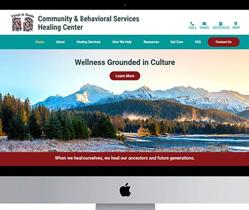2021


2021

On behalf of the Central Council of the Tlingit and Haida Indian Tribes of Alaska (Tlingit & Haida), I am honored to present the 2021 Annual Report.
Over the course of this past year, we have seen incredible and transformative progress on many fronts as we continue to move the Tribe forward and meet our citizens where they are.
In all we continue to do, our tribal citizens remain at the forefront. We have expanded our services and our office locations and workforce to better serve our tribal citizens. We have acquired new properties in Juneau, Alaska to finally create the centralized campus we’ve envisioned, opened a Child Welfare office in Seattle, Washington, will be opening an office in Anchorage, Alaska in early 2022, and are actively working toward establishing a presence in all of our communities.
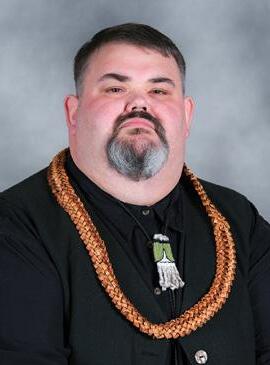
Wherever you are, you’re a tribal citizen and we are committed to removing barriers that threaten to disenfranchise our people and their connection to who we are.
Helping our people and families heal is another priority of Tlingit & Haida. In just one year, we’ve established our Community & Behavioral Services Healing Center to provide culturally responsive counseling, group therapy, and many other supports. We have also opened three non-congregate shelters in Juneau for our tribal citizens returning from incarceration or residential treatment who need sober, supportive and safe living. These services are having immediate impacts on the lives of our tribal citizens. As I have said before, putting our families back together is sovereignty. Following the guidance from our Delegates, we continue to build services to provide healing for all our tribal citizens.
We continue to expand educational opportunities through Generations Southeast (formerly the Vocational Training & Resource Center) to provide vocational training, distance learning, education support, and cultural classes and are actively working to build an education campus that serves and nurtures all of our children and youth.
The pandemic, support shortages, and lack of reliable transportation has shown us that food insecurity is a real and growing concern for our communities and people more than ever. We have responded to this and are working to build a Food Security department to assure we can meet our goals to protect, enhance, and provide for our way of life for generations to come. We will continue to engage on the federal level to support subsistence priority for harvesting our traditional foods.
As we continue to increase the Tribe’s services, we have built a workforce dedicated to providing their time and talent to our people. In just eight years, we have grown from 190 employees to over 400. With today’s technology, our workforce now includes tribal citizens throughout Southeast
Alaska and beyond. With support of our vocational trainings and employment & training programs, we are proud to see a majority are tribal citizen hires.
Together we have the answers and together we are stronger. Our Executive Council demonstrates this every day through their governance of the Tribe, advocacy for the needs of our communities and citizens at every level, and breadth of experience and knowledge.
The great work being done is the collective work of our employees, administration, and leadership who carry the mission of the Tribe forward. We are building a foundation for our future just as our ancestors taught us. Every day we are making tremendous strides and it has been my honor to serve you.
Gunalchéesh / Háw’aa,
Chalyee
 Éesh
Richard J. Peterson President
Éesh
Richard J. Peterson President
ALASKA
Anchorage [10]
Charmaine Ramos
Alvin C. Edenshaw
Shirley M. Kendall
Marvin L. Adams
Gilbert F. Stokes
Tasha Hotch
Mary Soots
Angela M. Michaud
Anthony R. James
Walter Hotch-Hill
Angoon [2]
Richard W. George
Maxine L. Thompson
Craig [3]
Judy Helgesen
A. Millie Schoonover
Clinton E. Cook
Haines [3]
Karen A. Taug
James E. Hart
Della M. Brouilette
Hoonah [3]
Frank G. Wright
Miguel Contreras
Julie Jackson
Hydaburg [2]
David Edenshaw Jr.
Sidney Edenshaw
Juneau [28]
Sue Ann K. Lindoff
Kenneth L. Southerland
William E. Martin
Selena A. Beierly
Jacqueline L. Pata
Louise A. Kadinger
Andrea E. Cesar
Paul Marks II
Ben Coronell
Juneau [28] Cont.
James Jack Sr.
Gerald Bennett
Mark Marks
Carolyn Martin
Ella Bennett
Douglas K. Chilton
Gloria Jack
Leona M. Santiago
Gail Dabaluz
Florence Sheakley
Arlene Bennett
Edward Hotch
Janice Hotch
Patricia Walker
Sandra Cross
Kevin Allen
Dionne Cadiente-Laiti
Annette Ulmer
Mary Lekanof
Kake [3]
Henrich Kadake
Delbert Kadake
Arthur Johnson
Kasaan [1]
Paula K. Peterson
Ketchikan [8]
Carrie Dodson
Rob A. Sanderson Jr.
Romay D. Edenshaw
Roberta L. Hull
Keenan Sanderson
Aaron Burns
Helene R. Simpson
Rebecca Estrin
Klawock [3]
Mary Edenshaw
Eva J. Rowan
Ernestine Kato
Klukwan [1]
VACANT
Metlakatla [2] VACANT
Pelican [1]
James Phillips
Petersburg [2]
Nathan C.S. Lopez
Mary Ann Rainey
Saxman [1]
Joe Williams Jr.
Sitka [6]
Paulette M. Moreno
Thomas D. Gamble
Patricia Alexander
Gerald E. Hope
Andrew L. Roberts
Robert Sam
Wrangell [3]
Susan G. Stevens
Luella Knapp
Lovey Brock
Yakutat [2]
Violet E. Slattery
Ralph J. Wolfe
San Francisco [5]
Will Micklin
John J. Silva
DonnaRae James
Robert E. Kennedy
Donavin S. Hannon
WASHINGTON Seattle [26]
Catherine N. Edwards
Michelle Demmert
Janet Peele
Karen Lauth-Elliott
James Price
Kara Mayer
LaVerne Wise
Seattle [26] Cont.
Bear Alexander
Daphyne Albee
Karen Nathan
Fred Lauth
Marian Lauth
Jessica Dominy
Cecilia Tavoliero
Joyce Alexander
Yakutat
Carolyn Heersema
Cindy Williams-Pederson
Stephanie Rainwater
Jocelyn Ketah
Andrew J. Strobel
Joey Ketah
Morgan Howard
Harry Watson
Voshte Demmert-Gustafson
Klukwan Haines
Kathryn Paddock
Jacob Cabuag Jr.
Patricia Allen-Dick
Pelican
Juneau
Delegates as documented in the 2021 Tribal Assembly credentials report.
Hoonah
Klawock
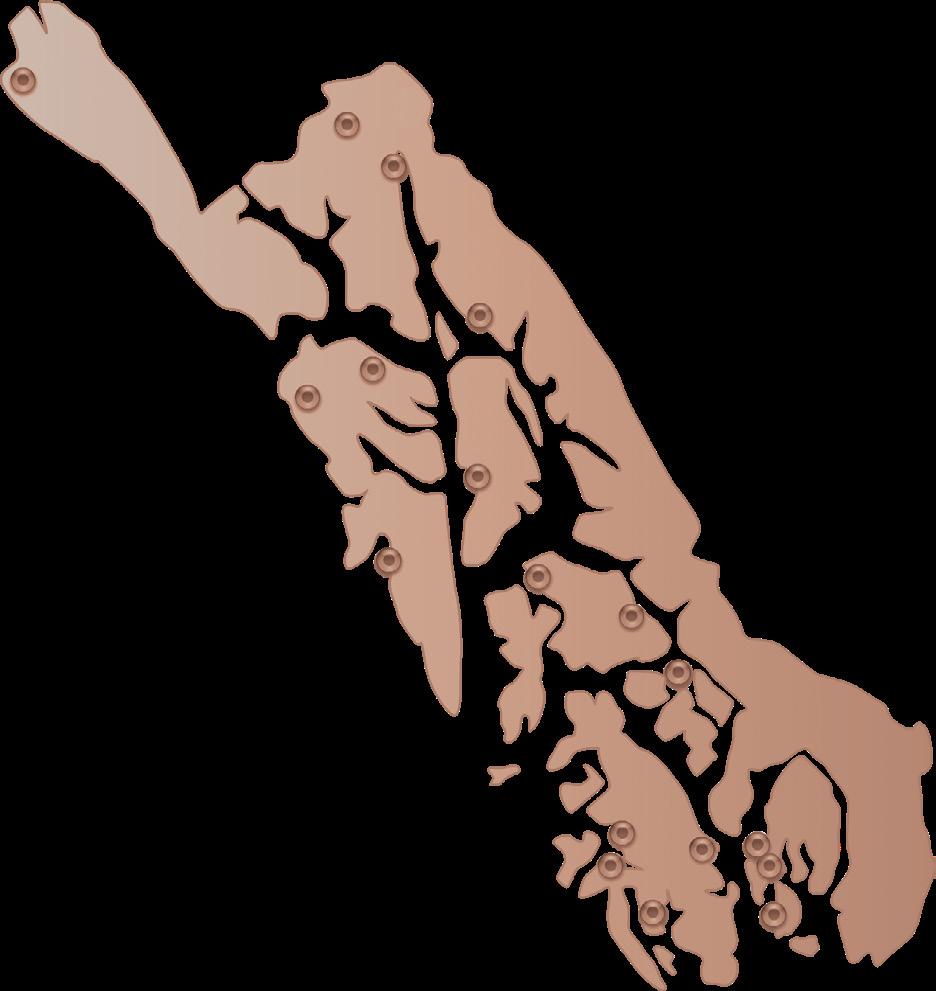
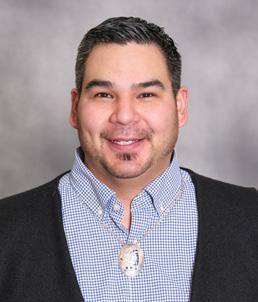

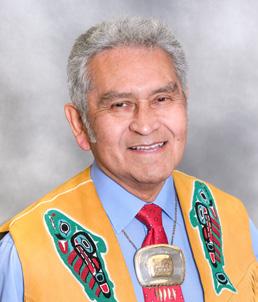
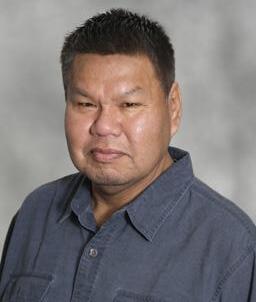
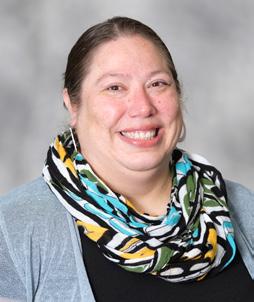
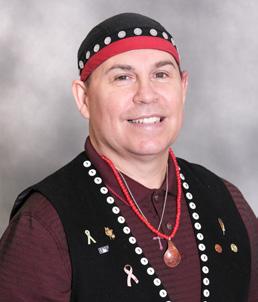


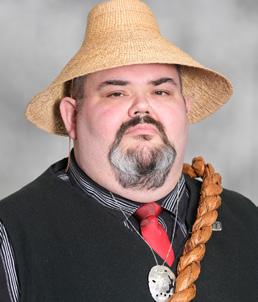
The Chief Development Officer (CDO) oversees the Tribal Development branch of Tlingit & Haida that includes areas such as broadband (Tidal Network), mergers & acquisitions, the Tribe’s construction company Southeast General Contractors and tribal enterprises, in addition to broad oversight of the Tribal Transportation and Business & Economic Development departments.
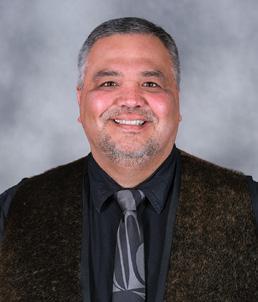
By building strong partnerships with a variety of industries, the CDO creates economic development opportunities for the Tribe within key business sectors. The CDO also resolves process lags and complex challenges by focusing on best practices that optimize profitability, uphold our tribal values, and work towards the Tribe’s long-term goals.
In 2021, the CDO provided direct oversight of the following departments, enterprises and activities: Business & Economic Development, Southeast General Contractors, Tidal Network (Broadband), Tribal Transportation, Tribal Enterprises (Sacred Grounds Café, Sacred Shine Auto Detailing, Smokehouse Catering, Smoke Signals, and Elizabeth Peratrovich Hall), mergers, and acquisitions.
Distributed $2.2 million in Rescue Small Business Grant program funds to 446 tribal citizen small businesses in 27 Alaska communities and 24 states.
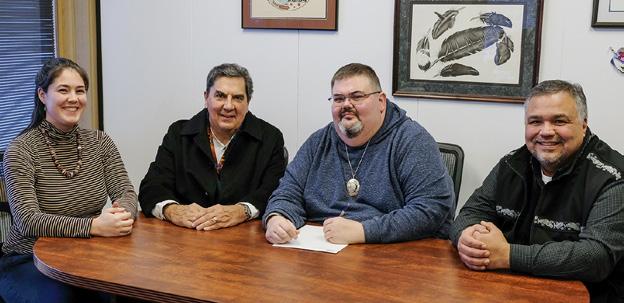
Created a broadband effort (Tidal Network) securing FCC 2.5 GHz spectrum and applied for $50 million in funding under the Tribal Broadband Connectivity Program (TBCP) to build out a wireless network covering over 20 Southeast Alaska communities.
Acquired 8.7 acres of real estate, including one of the largest acquisitions of office space in Alaska history, to meet the vision of improved access to services for tribal citizens through the development of a centralized Tlingit & Haida campus.
Secured contractors license for Southeast General Contractors and provided in-house construction services for 14 completed projects with a 90% Native hire rate.
Adapted tribal enterprises to “new normal” with added outdoor seating, grab & go food options, online ordering, pre-boxed meals, drive-by pickup, heating & air conditioning updates, and other touchless services.
Defend Tlingit & Haida and other tribal partners’ FCC 2.5 GHz spectrums by using Cell on Wheels (COWs) with first pilot project in Wrangell, Alaska.
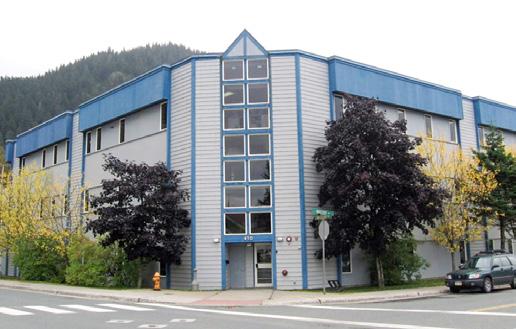
Reinvigorate efforts for the Cultural Immersion Park, expand joint travel industry ventures and establish a Tribal Tourism department based on a region-wide strategy.
Acquire large, external construction contracts through Southeast General Contractors and utilize the Tribal Transportation department for Kowee Subdivision road work.
Continue to acquire properties and businesses to meet Tlingit & Haida’s strategic plans for growth and economic sovereignty.
Increase number of tribal citizen applications for Rescue Small Business Grant funds and establish small business incubator and accelerator with added focus on innovation and clustering.
Support renovation efforts for post-pandemic compliant office spaces at 400 and 410 Willoughby Avenue and the Andrew Hope Building.

The Chief Financial Officer (CFO) provides oversight of the Tribe’s Finance personnel, fiscal management, General Fund budget, indirect and internal budgeting and accounting procedures, and financial reporting. The CFO also reviews and negotiates Tlingit & Haida’s indirect cost proposal, oversees the annual audit, and is responsible for the Tribe’s expenditures of approximately $90 million per year in accordance with Generally Accepted Accounting Principles.
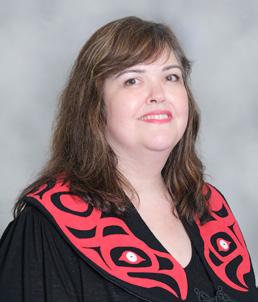
Tlingit & Haida employs a fund accounting system and operates on a fiscal year ending December 31. Support is provided to divisions and departments within the organization to ensure all grant requirements and statutory regulations are understood and met.
Theresa Belton Chief Financial OfficerIn 2021, a significant amount of time was dedicated to supporting the Tribe’s response to the COVID-19 pandemic and processing CARES Relief and Rescue Relief payments to tribal citizen households and tribal citizen small businesses.
Received Paycheck Protection Program loan forgiveness of $2,462,899 to pay for eligible payroll, business, and facility expenses for the period of May 13 to October 27, 2020.
Implemented a new mailroom and lockbox for check processing to assist with streamlining internal services while the offices are closed to the public and employees are working remotely. These new services will continue to increase efficiencies once offices reopen and employees are back onsite.
Initiated implementation of companion software to facilitate the outsourcing of check writing, document workflow, and task monitoring to work with the accounting software.
Completed the annual audit without any findings or reportable deficiencies. This is accomplished by compliance with federal regulations, enforcement of policies and procedures, and effective management of operations and internal controls.
Prepared the 2022 Indirect Cost Proposal and submitted for negotiations with the Interior Business Center with a favorable rate of 28.59%. In order to be effective with budget planning, a completed agreement is preferable before the start of the fiscal year.
The 2021 year-end balance of the Tribe’s Trust Fund was $23,569,893 which is a net increase of $1,200,496 for the year. The oversight of the Trust Fund is managed by the Investment Committee. The committee consists of the President, Chief Operating Officer, Chief Financial Officer, and two Executive Council members.
Transferred out $182,908 to cover the 2020 indirect shortfall and tribal direct, and $2,183,438 to pay off the Kowee Creek property.
Transferred in $450,000 from our first Tlingit Haida Tribal Business Corporation dividend.
Prepare the 2023 Indirect Cost Proposal and conclude negotiations with the Interior Business Center on a favorable 2023 indirect cost rate.
Update tribal fiscal policies to make them current and easier to understand.
Develop a comprehensive financial training module for tribal employees to use in the course of their duties.
Catherine Edwards (Chair)
Patricia Alexander
Jacqueline Pata
Maxine Thompson
Millie Schoonover
James Jack Sr. (Chair)
Marvin Adams
Will Micklin
Paula Peterson
Helene Simpson
The Chief Operating Officer (COO) provides leadership of the Tribe’s community and client services departments, executive administrative support to the President in all areas of tribal executive management, and supports relationships with government agencies, businesses and private entities.



The COO is charged with ensuring operations remain consistent and within the framework of budgets, plans, regulations and laws, and policies and procedures. The COO also serves on several boards and committees for the Tribe and as a liaison with various government and private organizations.
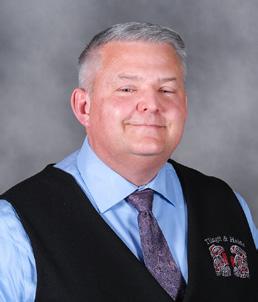
In 2021, the COO provided direct oversight of the following departments and divisions: Community & Behavioral Services, Cultural Heritage & Education, 477 Division, Grants & Resources, Human Resources, Information Technology, Native Lands & Resources, Organizational Development, Public Safety, and Self-Governance.

Completed 12 Bureau of Indian Affairs (BIA) 105(l) leases for eligible facilities carrying out related programs, functions, services, and activities. The value of the 12 leases is $3.1 million.
Made significant progress with Tribal D™ on strategic planning process and mapping for a tribal citizen portal in TribeVue™.

Successfully opened two Reentry & Recovery non-congregate sheltering projects that provide a total of 27 beds in Juneau, Alaska.
Established the Tribe’s first out-of-state Child Welfare office in Seattle, WA.
Began early phases of implementation of the Indigenous Guardians program in collaboration with the United States Forest Service.
Presented and participated in meetings with Tlingit & Haida Community Councils, Delegates, and local tribes to share information on the ARPA. Travel was paused due to COVID-19’s Delta variant spikes but meetings resumed virtually using the Zoom platform.





Established a new Community & Behavioral Services (CBS) Division, which incorporates the Tribal Family & Youth Services and Reentry & Recovery departments, to expand programming around prevention, treatment and recovery, and provide direct clinical care to tribal citizens.
Reorganized all early education services under the Cultural Heritage & Education Division to build synergy between departments.
Developed strategy for the Tribe’s leadership on utilization of American Rescue Plan Act (ARPA) funds.
Implemented additional CARES Relief and new Rescue Relief programs for tribal citizen households.
Partnered with Sealaska and Shee Atiká corporations on the distribution of their CARES funds to their shareholders consistent with funding requirements.
Expanded the Information Technology department’s capacity and staffing to safely meet the needs of the Tribe.
Developed, hired leadership, and implemented a new Grants & Resources department to create an organization strategy and centralize the Tribe’s grant processes.
Implement compensation study to ensure Tlingit & Haida can attract and retain talent in the market.
Secure 105(l) lease agreements from the BIA for 12 of Tlingit &Haida’s eligible facilities.
Establish a Community Navigators program in Tlingit & Haida recognized communities.
Expand Behavioral Health startup with new clinical modalities.
Assist Community Councils in the prioritization and implementation of Tlingit & Haida’s Community-Directed supplemental relief programs
Restructure and expand administrative support functions in the Human Resources, SelfGovernance, and Information Technology departments.
The Tribal Court was established by Articles VII and XI of the Constitution as a separate branch of government to exercise the Tribe’s inherent sovereignty and provide a culturally appropriate forum for tribal citizens to address their judicial needs.
The Executive Council, Judiciary Committee, elected Justices and Tribal Court staff continue to work toward expanding and sustaining the Tribal Court’s judicial services. The Tribal Court’s docket typically contains the following types of cases:
» Adoption
» Child Custody
» Divorce
» Domestic Violence
» Parental Termination
Ka’illjuus
Lisa Lang
Chief Justice Judiciary Committee:
DonnaRae James, Chair
Patricia Alexander
Carrie Dodson
James Hart
Tasha Hotch
William Martin
» Child Support
» Child Welfare
» Civil
» Emancipation
» Guardianship
» Marriages
» Paternity
» Wellness - Youth & Adult
The Tribal Court’s judicial services are guided by the traditional values of respect, patience, and the responsibility to safeguard the future of the Tribe by promoting healthy families. The Tribal Court resolves matters by reviewing proposed agreements of the parties or by hearing testimony and reviewing evidence to render a written and oral decision. Each final decision made at the trial court level may be reviewed upon request to the Tlingit & Haida Supreme Court, which is comprised of three elected Justices: one Chief Justice and two Associate Justices.
Will Micklin
Eva Rowan
The Tribal Court also provides technical assistance as a resource to other Alaska tribes. Other Alaska tribes may request assistance or information on how to start a tribal court, explore the various methods of dispute resolution and restorative justice, and how to maintain stability to keep judicial services available.

During the Fall of 2021, the Tribal Court underwent structural changes to realign some of its services. Domestic Violence advocacy and Home Study Investigations complemented the other services provided by the Tribe’s Community & Behavioral Services (CBS) Healing Center. Those services and their respective staff have been relocated under CBS.
A priority for 2021 was employee recruitment and the continued development of the Court through Victims Services planning and implementation of our Wellness Courts for families affected by the opioid and substance misuse crisis. The Tribal Court met or exceeded most of its 2021 goals.
Continued to implement the Tribe’s COVID-19 emergency protocols and work-from-home plan with continual increase in cases filed and hearings held at the Trial Court level.
Negotiated a framework for accepting referrals from the State of Alaska – Department of Juvenile Justice (DJJ) to Youth Healing to Wellness Court that became the foundation of a Memorandum of Understanding between the Tribe and DJJ.
Continued partnership with the Tribal Family & Youth Services department’s Elderly Services program to facilitate Elders Talking Circles.
Awarded continued one-time funding from the Bureau of Indian Affairs (BIA) - Tribal Justice Support; Phase-II funding from Department of Justice (DOJ) - Office of Juvenile Justice and Delinquency Prevention for an additional three (3) years of funding; and funding through the Tides Foundation to support peacemaking training opportunities.
Provided staff support to the Judiciary Committee and Violence Against Women Task Force.
Continued planning and preparation for the relocation and renovation of the new Tribal Court space.
Conducted mandated home studies and facilitated supervised phone calls in adoption, custody, and guardianship cases through the Family Court Services program.
Provided support and advocacy services to 10 petitioners involved in domestic violence cases.
Hosted a Domestic Violence Awareness training for the Tribe’s Tribal Child Support Unit.
Partnered with Anchorage Tlingit & Haida Community Council, Alaska Native Justice Center, Alaska Native Women’s Resource Center, and Alaska Native Heritage Center, to host a “Keeping Our Families Safe” webinar series.
Helped sponsor the Increasing Safety for Alaska Native Women Summit in Yakutat, Alaska in partnership with Yakutat Tlingit Tribe and the Alaska Native Women’s Resource Center which addressed domestic and gender-based violence.
Provided a family safety presentation with the Alaska Native Women’s Resource Center at the Yakutat Culture Camp.
Assisted in setting offices up on Prince of Wales Island, Alaska.
Provide Adult Wellness Court services to individuals and families impacted by opioid addiction and misuse who may also face removal of tribal children from their homes.
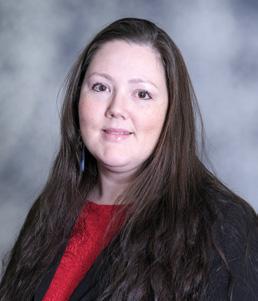
Serve tribal youth (14-18 years old) through the Youth Wellness Court.
Continue to provide home study reports in adoption and guardianship cases through Family Court Services.
Continue to partner with Hoonah Indian Association by providing technical assistance for the development of their tribal court.
Host trainings on Indigenous methods of dispute resolution throughout Southeast Alaska to support and foster community driven solutions.
Continue to offer and conduct Indigenous methods of dispute resolution.
Continue to build tribal court capacity through the strategic planning and partnership with the Alaska Court System in the potential establishment of an Indian Child Welfare Act (ICWA) Court.
The Business & Economic Development (BED) department is dedicated to creating tribal enterprises that not only have a financial bottom line but a social, cultural bottom line that reflects who we are as Native people.
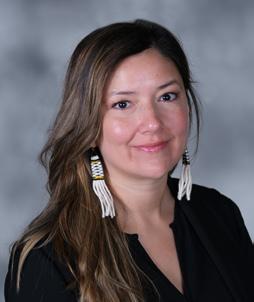
Tribal enterprises include:
» Elizabeth Peratrovich Hall
» Sacred Grounds Café
» Sacred Shine Auto Detailing
» Smokehouse Catering
» Smoke Signals
» Southeast General Contractors
Although each tribal enterprise varies in nature and scope of work, they are all grounded in the mission and vision to help economically diversify the Tribe and provide employment and training opportunities to tribal citizens. BED works internally with several of the Tribe’s departments such as Employment & Training, Head Start, Reentry & Recovery, and Temporary Assistance for Needy Families (TANF) to place clients in work experience positions within the tribal enterprises.
BED enhances community planning efforts on economic development projects in Southeast Alaska through the development of the Tribal Community Economic Development Strategy (Tribal CEDS) plan and by partnering with local, state and federal agencies. The Tribal CEDS identifies the economic conditions and needs of the region and is a tool to initiate and sustain local planning and development efforts. The plan is updated every five years and developed with input from tribes, tribal citizens, Alaska Native corporations, and small business owners.
Jodie Gatti Tribal Enterprise ManagerThe department also supports tribal small businesses through the American Rescue Plan Act (ARPA) Rescue Small Business Relief program which provided grants of $5,000 to 446 tribal citizen-owned small businesses in 2021. The program will remain open through 2024 or until all funds are disbursed.
In 2021, BED’s tribal enterprises, which are largely based on gatherings, events, and face-to-face contact continued to be significantly impacted by the COVID-19 pandemic. Through the vaccine launch and variant surges, every effort was made to keep enterprises running and employees at work while ensuring the safety of employees, citizens, customers, and the general public. BED implemented best practices incorporating safety preparedness and mitigation plans to operate following tribal and state mandates.
Administered the Rescue Small Business Relief program that provided over $2 million in grants to tribal citizen small business owners adversely impacted by the COVID-19 pandemic in 27 Alaska communities and 24 states.
Conducted retail sale of fireworks in June, July and December of 2021 which generated just over $250,000 dollars in gross sales.

Successfully transitioned the Little Eagles and Ravens Nest (LEARN) child care to the Cultural Heritage & Education Division to become part of the Tribe’s holistic education efforts.
Relocated Sacred Shine Auto Detailing to a larger more convenient location while generating over $100,000 in net revenue.
The Certified Tribal Artist program promotes Alaska Native-made arts and handicrafts through certifying tribally enrolled artists. Upon certification, applicants are issued a certificate, permit card, and free gift tags, stickers, or a combination thereof to assist in marketing tribal citizen artwork.
Provided 19 certified tribal artists with Rescue Small Business Relief grants of up to $5,000.
Certified 11 Tlingit and/or Haida tribal citizens under the Certified Tribal Artist program bringing the total number of certified tribal artists to 80.

The Tlingit & Haida Cultural Immersion Park (Immersion Park) is a long-term commitment of the Tribe. The Immersion Park will serve as a powerful instrument in fulfilling the Tribe’s mission and vision, and enhance the awareness, preservation and perpetuation of our Southeast Alaska Indigenous cultures.
Received a report from NORTECH, Inc. as a follow up to the spillage identified onsite and continued efforts to address environmental issues through collaboration with the Native Lands & Resources department and other tribal entities including the Alaska Native Tribal Health Consortium.
Hosted youth cultural activities outdoors at the Thane site.
Explored various grant opportunities to fund site development with ongoing efforts around ARPA.
Continued partnership with the Thane Neighborhood Association on a project to support State of Alaska Department of Natural Resources and safe beach access.
Continued ongoing efforts exploring procurement of leases and transfers of land ownership for the remaining surrounding parcels.
Apply for U.S. Economic Development Administration Technical Assistance fund program.
Provide remote communities with in-person technical assistance pop-up clinics for Rescue Small Business Relief program.
Create and implement a business consultant service to provide startup, incubation, on-going enterprise education, financial referral, and other pertinent services to tribal citizens.
Continue to identify grants, private endowments, and fundraising opportunities for the Immersion Park.
Revamp the Certified Tribal Artist program and its logo and expand services to include an online artist directory and featured artists.
January - October
The Communications department is responsible for the branding of the Tribe and ensuring that its presence in all media is carefully delivered. The department shares current information on the Tribe’s governmental and administrative activities, as well as programs and services. As an in-house production team, Communications produces a variety of materials (presentations, brochures, flyers, videos, banners, etc.) to support all Tlingit & Haida programs directly.
Communications is also charged with overseeing the Tribe’s official social media platforms and website, and disseminates information through these channels, as well as through press releases, eNews blasts, public service announcements and quarterly newsletters.
In 2021, the Communications team grew by one position to increase multi-media efforts and bolster the Tribe’s social media engagement.
Issued 30 press releases and 10 eNews blasts through expanded journalism efforts.
Provided technical support for 30 Facebook Live events: Elders Talking Circles (6), Executive Council Town Hall Meeting (1), Lunchtime Chats (17), Native Issues Forums (5), and President’s Awards Ceremony (1). A majority of the Facebook Live events required developing a program format, flyer, presentation slides and advertising.
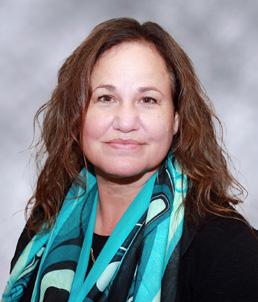
Maintained the Tribe’s official website and responded to more than 1,100 webmaster email inquiries.
Produced the Tribe’s 2020 Annual Report and four quarterly newsletters as well as designed a variety of flyers, brochures and booklets.
Provided technical support and completed over 30 recording sessions for the Tribe’s virtual 86th Annual Tribal Assembly which was webcast live on Tlingit & Haida’s Facebook page for tribal citizens and the general public.
Increased engagement and followers on the Tribe’s social media channels by 10%. At year-end, Tlingit & Haida had over 15,800 followers on Facebook, over 4,600 followers on Instagram and over 1,000 followers on Twitter.
Scripted 11 radio ads to expand outreach on Tlingit & Haida’s programs, services and activities.
Posted 52 Throwback Thursdays to share cultural history and 52 What’d Ya Say Wednesdays to support Lingit, Xaad Kil and Smalgax language learning on social media.
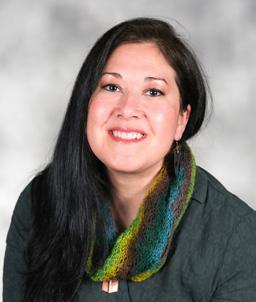
Begin digitizing Tlingit & Haida’s photo and video archives for preservation and historical record.
Redesign official website to be meet Americans with Disabilities Act of 1990 (ADA) requirements and to improve the experience of visitors accessing the website via mobile devices.
Expand opportunities to support the Tribe’s programs and services through increased use of multi-media.
The Community & Behavioral Services (CBS) is a division within the Tribe that was developed in 2021. The focus of the new division is on the wellness aspect of tribal citizens and their families by expanding programming around prevention, treatment and recovery, and providing direct clinical care to tribal citizens.
In order to ensure cohesion in the delivery of support services, the division provides leadership oversight of the following departments:
» Behavioral Services
» Community Advocacy
» Family Court Services
» Reentry & Recovery
» Tribal Family & Youth Services
Established a new CBS Healing Center offering culturally responsive healing for tribal citizens (youth and adults), including those who need help addressing the legacy of historical/intergenerational trauma and the challenges of life today. The CBS Healing Center opened virtually in November and began accepting participant referrals.
Successfully staffed new service delivery team at 100% capacity—this is significant success for a new behavioral services department. Furthermore, 90% of CBS Healing Center’s clinical team are Indigenous providers (5 Master’s Level Clinicians, 4 Behavioral Health Aides, 1 Psychology Doctoral Intern, and 1 contracted Testing Psychologist).
Launched new CBS Healing Center Website to provide tribal citizens with access to online resources and self-referrals for treatment.
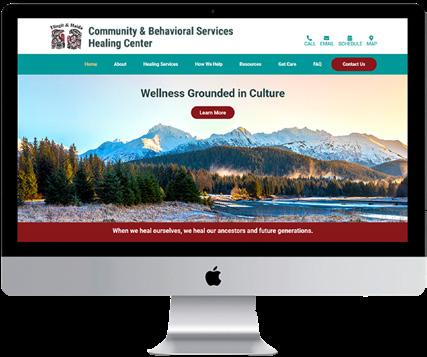
Implemented a new private and confidential customized electronic behavioral record keeping system (FacetoFace).
Provided culturally responsive programming, including talking circles as the treatment modality to serve tribal citizens referred by Wellness Court.
Coordinated Culture Heals film project and conducted over 12 interviews with Elders, tribal leaders, culture bearers, and behavioral services providers with lived experience.
Initiated process to become a State of Alaska (SOA) Medicaid provider and bill for services.
Initiated accreditation process with the Commission on Accreditation of Rehabilitation Facilities (CARF) to ensure compliance and expectations of SOA Community Behavioral Health Services agency.
Initiated partnership with the Alaska Native Tribal Health Consortium (ANTHC) to provide Behavioral Health Aide training opportunities, including funding resources to certify BHAs.
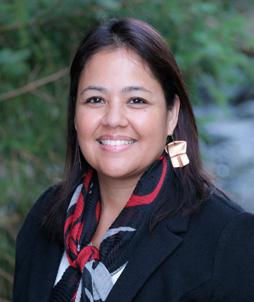
Facilitated an ICWA staff retreat with six staff that focused on ethics, boundaries, mandated reporting, accountability/dependability, adaptability to change, self-care, and the importance of workplace cleanliness for a healing space for participants.
Coordinated a strategic planning session to design a culturally responsive Intensive Outpatient program.
Facilitated a Clinician’s Retreat with four clinicians that focused on standard of care expectations; joint responsibility in cultivating a healing space that promotes Southeast Traditional Tribal Values and treating the whole person; training/certifications; importance of self-care; and preparation for submission of Medicaid Billable Agency application and pursuit of CARF.
Provided four presentations on the Tribe’s Wellness Court Initiative (September - October) to the Juneau Police Department.
Traveled to Kake, Alaska and provided mental health support and debriefing to community members following a community crisis.
The Behavioral Services program, through the CBS Healing Center, offers outpatient assessments for mental health and substance use disorders, referral for psychological testing, culturally responsive individual counseling, family counseling, group counseling, debriefing for critical incidents, and sameday crisis response to those who are experiencing immediate need.
Received 105 referrals for clinical treatment services for mental health and substance use disorders.
Hosted three (3) Wellness Wednesdays sessions for tribal citizens to promote mental health literacy, reduce stigma, and share information relating to holistic wellness, self-care and breaking down barriers to encourage help seeking behaviors.

Hosted 29 Hope & Resilience Talking Circles sessions to 117 employees and healthcare providers to help reduce stress and increase coping skills during the COVID-19 pandemic.
Hosted an in-person talking circle to explore designing a culturally responsive men’s healing program in alignment with our traditional values. A subject matter expert was sponsored by NAMI Juneau in support of the Tribe’s new program development.
Developed a crisis response resource to distribute to those going through suicide grief and loss.
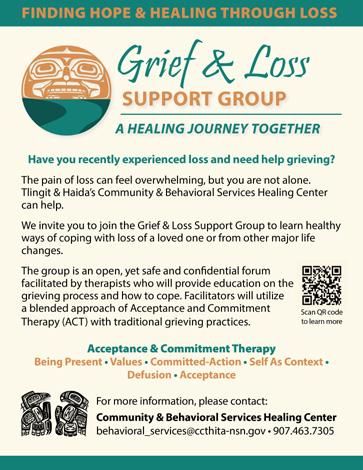
Hosted a “Trunk or Treat” community outreach event in Juneau, Alaska; approximately 450 trunk or treaters were served while maintaining social distancing and safety measures.
The Community Advocacy program is designed to provide access to culturally responsive advocacy services for tribal citizens in Southeast Alaska. The program offers services, referrals, relocation during emergencies, community resource sharing and resources in support of tribal citizens affected by crime.
Community Advocacy supports Tlingit & Haida’s Tribal Court and partnering programs in addressing crimes such as assault, robbery, vandalism, intimidation and crimes against Elders. The program also provides emergency intervention services, stabilization, legal advocacy, behavioral services, public information, and follow-up assistance in accessing other services tribal citizens require to regain self-worth, self-esteem, and respect.
Partnered with Tribal Court to reorganize the Community Advocacy department under the CBS Division. The reorganization has increased synergy between participant needs and referral for additional behavioral services supports.
Established program eligibility criteria, referral, and client assessment forms serving tribal citizens with legal, emergency housing, medical, physical, and emotional support throughout Southeast Alaska.
Secured Community Advocacy grants to fund three positions within TFYS department to serve an ongoing three dozen Elders affected by crime in Juneau, Alaska.
Provided advocacy services to over 60 tribal citizens who experienced domestic violence.
Completed all related preparation required to launch a needs assessment survey to help identify existing resources and gaps in services regarding tribal citizens affected by crime. Results will be used to complete asset mapping with Tlingit & Haida’s Violence Against Women (VAW) Task Force.
The Family Court Services (FCS) department provides services to court-involved tribal citizens and their families. FCS services include court ordered investigations for child custody, guardianship, adoption, or other child welfare related placements as well as court advocacy for tribal citizens.
Partnered with Tribal Court to reorganize Family Court Services (FCS) under the CBS Division. The reorganization has demonstrated increased communication and collaboration across departments for referring and ensuring client needs are met with the highest quality of care.
Served 21 individuals and families around court ordered investigations for child custody, guardianship, adoption, or other child welfare related placements.
Launch an online addiction treatment educational program paired with 24/7/365 professional/peer support and referral for services program known as Culture Heals.
Develop and facilitate a culturally responsive Men’s Healing program for tribal citizens who struggle with behavioral health issues.
Continue efforts to establish Behavioral Services as a Medicaid billable agency and attain accreditation from the CARF.
Launch needs assessment and summarize data gathered to complete asset mapping to identify and highlight existing resources, as well as gaps in services, with a focus on resource and service accessibility for rural citizens who have experienced crime.
Refine infrastructure and increase effective communication and collaboration between departments involved on cases to ensure the highest quality of support to tribal citizens.
Establish an online training library for Family Court Service Investigators to provide the highest quality of support to our tribal citizens.
Increase collaboration with Tribal Court to ensure all tribal citizens have the right and access to a legal advocate timely.
The Reentry & Recovery department creates and maintains community and tribal resources for recovery and justice-involved individuals. The department oversees the following non-congregate sheltering programs in Juneau, Alaska:

» Alaway Avenue: The 15-resident facility for females formerly incarcerated, have completed residential treatment, or are in recovery needing a safe sober living environment; this property accommodates children visits
» Allen Court: The 12-resident facility for males formerly incarcerated who struggle to find housing upon release, including those with sexual offenses
Talia Eames Manager» Haven House: The 5-resident facility serves women formerly incarcerated, who have completed residential treatment, or are in recovery needing a safe sober living environment.
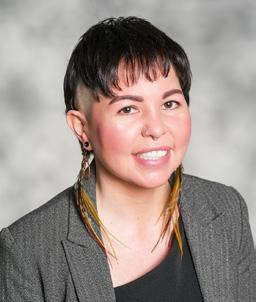
Reentry & Recovery provides sober and supportive non-congregate sheltering for citizens returning from incarceration, cultural and peer-supported reentry and recovery programming, employment and training opportunities, and intensive case management specifically for participants.
The department works closely with the Tribal Court and other tribal justice system partners to ensure cohesion in program development and restorative justice practices.
Reentry & Recovery’s focus is to reduce new entries into homelessness by breaking the cycle of recidivism through the preventative measure of supporting tribal citizens returning from incarceration.
Received permanent occupancy permits and achieved operational capacity for all three noncongregate sheltering properties.
Completed construction on the Allen Court and Alaway Avenue non-congregate sheltering properties.
Awarded $50,000 grant from the Juneau Community Foundation Hope Endowment Fund.
Awarded $63,640 grant from the State of Alaska Department of Health and Social Services (DHSS) for recovery housing.
Awarded second year of the DHSS Recovery Housing Grant ($155,225). This grant is instrumental in expanding staff capacity, supplies and recovery services for the Alaway Avenue non-congregate shelter.
Developed a streamlined process and partnership with Front Street Clinic for behavioral health assessments for incoming residents.
Partnered with the Cultural Heritage & Education department to assemble over 100 packages with sleeping bags for community members experiencing homelessness.
Created Zoom Rooms at all three non-congregate shelters for resident virtual case management and other appointments. This continues to be necessary due to COVID-19 mitigation safety measures.
Launched a nine-person Community Advisory Board (CAB) to provide guidance and support around the three non-congregate shelter operations in the community. Membership includes Reentry & Recovery, Bartlett Regional Hospital, returning tribal citizens, State of Alaska Department of Corrections, Juneau Police Department, and several invested community members.

Recruit and hire qualified staff to continue building a comprehensive recovery program with cultural activities, life skills groups, training & education, job placement, volunteer groups, and community engagement.
Complete a Tribal Action Plan addressing substance misuse throughout Southeast Alaska.
Conduct public presentations and market program services to ensure tribal citizens throughout Southeast Alaska and beyond are aware of resources available to them.
Establish 100% occupancy at all three non-congregate shelters.

The Tribal Family & Youth Services (TFYS) department administers the programs for Indian Child Welfare Act (ICWA), Child Welfare, In-Home Services, Foster Care Licensing, and Wellness (Elders and youth). The department assists children, youth, Elders, and families in achieving safety, stability, and security through services established by tribal values and strength-based practices. TFYS strives to continue the recognition of tribal sovereignty and to expand services.
In 2021, TFYS focused efforts to implement the Alaska Tribal Child Welfare Compact (Child Welfare Compact). The Child Welfare Compact which became effective December 15, 2017, was a collective effort made by tribes and tribal organizations with the State of Alaska. The Child Welfare Compact reflects the State of Alaska’s constitutional and statutory obligation to provide child welfare services and authority to enter into inter-governmental agreements with tribes and tribal organizations to fulfill its obligations, the authority of Alaska Native tribes under federal and tribal law to exercise authority over child welfare matters, and the unique state-tribal cooperation that has developed in Alaska to ensure improved compliance with the Indian Child Welfare Act (ICWA) and transformation of child welfare services in an effort to reduce the rate of out of home placement and improve the well-being of all Alaska children and families.
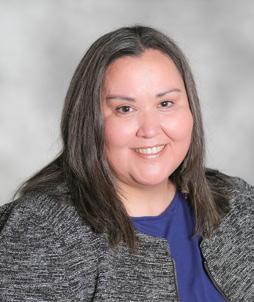 Mary Johnson Director
Mary Johnson Director
Continued high involvement with the State of Alaska on the Child Welfare Compact, resulting in an increase of funding to support efforts to implement scopes of work.
Continued the evaluation of Tribal Title IV-E Administrative & Training and Maintenance agreements with the State of Alaska develop a plan to maximize reimbursement to provide best practices to all children and families served.
Received a one-year Tribal Title IV-E Planning grant extension to update the TFYS Policy & Procedure manual, Eligibility manual, Tribal Foster Care Licensing manual, Tribal Statute Title 04 – Child and Family, and agreements with the State of Alaska to qualify for direct federal reimbursement.
Identified and customized a data management platform (Face-to-Face) to capture data to meet Title IV-E Direct Planning grant and other grant report requirements, and to track and monitor efforts in providing quality services.
Provided a presentation to over 100 participants at the statewide Child Welfare Conference that highlighted the work done through the Tribe’s Wellness program.
Participated in Tribal/State Compact negotiations and a Compact Tribal Caucus. Process was negotiated for service area, prevention scope, and the funding formula with an estimate of $177,475 for FY22. Implemented three of the five scopes of work under the Child Welfare Compact (Diligent Relative Search, Ongoing Placement Search and Family Contact).
Participated in Compact negotiations that led to an increase to $260,338 in state funds for FY23 to complete the scopes of work in the Compact.
Received State funding from the Family First Prevention Services by Tribal Title IV-E Agencies in the annual amount of $87,230.
Continued strong partnerships with the Temporary Assistance for Native Families (TANF) and Child Care departments to promote family preservation through weekly meetings.
The Child Welfare program protects and maintains the integrity and rights of tribal children, their families or custodians, and the Tribe in involuntary custody proceedings. The program provides foster care and case management services to children and parents or guardians in communities served and serves as tribal advocates at the intake, research, investigative, prevention/early intervention and legal intervention stages of tribal child welfare cases.
Opened a virtual office in Seattle, Washington to provide ICWA support to tribal citizens involved with Child Protective Services in Washington. The staff consists of a child welfare attorney, family case worker, and an administrative assistant. Office space is pending due to the COVID-19 pandemic.
» Provided direct services to approximately 50 children and their families through meetings, visits, and court.
» Secured agreement with Washington state to allow direct release of Tlingit & Haida Rescue Relief Household funds to families caring for tribal children.
» Conducted field visits to four of six regions in Washington state Regions 1 (Spokane, Wenatchee), 3 (Sedro Wooley, Whidbey Island), 4 (Seattle, Kent, Auburn), and 6 (Port Townsend, Vancouver).
Collaborated with Washington and Alaska ICWA/WICWA Appeals advocates to propose a Title 1919 Agreement that allows for Washington and Alaska interstate placement of children in state custody.
Maintained a successful and productive relationship with Casey Family Programs (CFP) to support the transformation of child welfare in Alaska.
» CFP donated $180,000 in 2021 to support the efforts of TFYS.
» CFP completed year one of five of the agreement with Tlingit & Haida and provided resources through consultants to develop programming, provide training opportunities, and to support the growth of the TFYS department.
Increased support service capacity by securing new office space in Klawock, AK and hiring two additional staff (family case worker and administrative clerk) to support the rural office.

Awarded Department of Justice funding and utilized the model created for the Seattle office to secure staff to provide ICWA services through Tlingit & Haida’s Anchorage office.
Advocated for Office of Children’s Services (OCS) to follow their policies and procedures to notify tribes when OCS will be traveling to rural communities.
Provided case management services for 691 ICWA cases: Alaska (612), Washington (50), other states (29).
Increased development of in-home services through the Preserving Native Families (PNF) program and the collaborative relationship with the Tribe’s TANF department to enhance the knowledge of cross-training to serve families involved in both services.
» Expanded to work with Adult Not Included (ANI) families.
Received PNF carryover request, along with a continuation request of federal funds under the TANF-Child Welfare grant to explore the utilization of the Structured Decision-Making assessment with TANF.
Surpassed the statewide rate of tribal intervention on a child’s behalf. Work is being done to ensure all tribal children have an intervening tribe.
The Wellness program works to support the health and well-being of tribal citizens by linking and empowering Elders, youth and families.
Designed creative ways to serve Elders and youth while maintaining high engagement during the COVID-19 pandemic.
» Over 120 Elders in Juneau were provided perishable and non-perishable nutritional items and a hot lunch by Smokehouse Catering delivered once a week.
» 153 Elders from 15 communities in received emergency assistance support.
» Hosted weekly Elders Talking Circles via Zoom with activities led by staff and Elders to help decrease loneliness. Nine talking circles were held via Facebook live.

» Negotiated an agreement with the Juneau School District that allowed staff to be in the schools to hold study halls, teach Lingít, and
Olympics.
» Hosted a summer camp that helped 43 students achieve credit for missed Physical Education school hours.
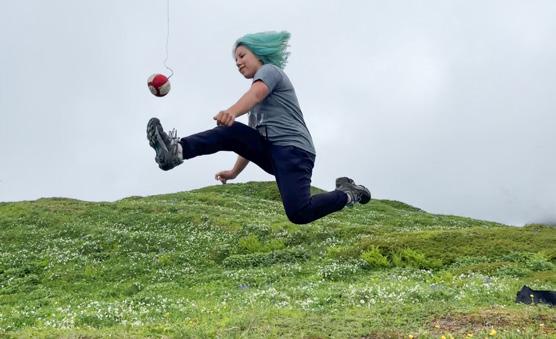
Fully implement and track data for the five scopes of work under the Child Welfare Compact that include: Initial Diligent Relative Search, Licensing Assist, Safety Evaluation of Relative Homes, Family Contact, and Ongoing Placement Search.
Complete the Tribal Title IV-E Direct Pre-Print which will detail out and refine the continuum of services offered in the TFYS department to include all programs.
Work with the State of Alaska to:
» Create a dual licensing application for potential tribal and state foster parents to obtain a license, and
» Advocate for the change in state law to recognize multi-tribal interventions, as well as adding the federal Indian Child Welfare Act into Alaska statute.

The Cultural Heritage & Education Division oversees the coordination of Tlingit & Haida’s cultural and educational programs and activities in collaboration with other tribes and entities. The division reflects the principle that our communities, lands, and tribal citizens thrive when our culture and education are our foundation.
Cultural Heritage & Education strives to incorporate ancestral knowledge to strengthen our languages, arts and cultural practices for the well-being of our citizens and government.
Sarah Dybdahl Senior DirectorIn 2021, Tlingit & Haida strategically housed the Tribe’s early education programs (Head Start department and Little Eagles & Ravens Nest (LEARN) child care center) under Cultural Heritage & Education to allow closer collaboration and synergy across our programs to best serve families and students.
Departments and programs housed under the division include:
» Cultural Heritage
» Haa Yoo X’atángi Kúdi
» Head Start
» Higher Education
» Johnson O’Malley
» Little Eagles & Raven Nest
Child Care
» Navigators
» Vocational Training & Resource Center
Awarded $175,000 from Sealaska Language Endowment Fund to continue the Increasing Fluency project to support six intermediate/advanced learners (two Lingít, two Xaad Kil, and two Sm’algyax language scholars).
Awarded an Institute of Museum and Library Services Native American Basic Library grant of $10,000 to support expansion and growth of the Tribe’s library collection.
Hired a manager to oversee the Cultural Heritage department.
Reorganized all early education services under the division to build synergy between departments.
Awarded a three-year Department of Education Alaska Native Education Program grant to support the REWARD proposal with total funding of $2,587,915 to collaborate with five school districts and seven partners.

Received one-year extension from the Administration for Native Americans to continue providing Lingít immersion through Haa Yoo X’atángi Kúdi.
Hired a Tlingit language specialist to strengthen staff capacity and the language in the room when children are present.
Haa Yoo X̱ ’atángi Kúdi is a community-based language learning project that focuses on improving language transmission between generations and within families. The program immerses students, ages 3-6 years old, in the Lingít language and ensures families are provided the resources needed to be on the language journey with their children.
Provided a total of 129.75 hours of Lingít language immersion with 108 in-person hours and 21.75 virtual hours for 15 students January through May and 6 students September through December.
Participated in professional development through the Early Childhood Development Association, Culturally Responsive Conference, Professional Learning & Sharing Community sessions, and a linguistics course.
Created an interactive online presentation to help teachers learn basics of Tlingit orthography; presented at Culturally Responsive Education conference hosted by Sealaska Heritage Institute.

Created 20 literacy books to support language acquisition and age-appropriate content including the Early Readers Lingít Alphabet book series.
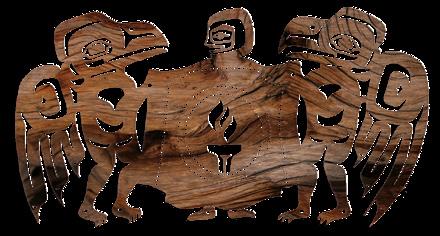
Began developing a two-year rotating curriculum for Haa Yoo X’atángi Kúdi.
Provided monthly learning bundles to 16 students and 11 families.
Developed a Google Site for Haa Yoo X’atángi Kúdi to create accessible language materials and resources for students and families.
Hosted an amazing, safe, and socially distanced graduation ceremony for Haa Yoo X’atángi Kúdi students in May of 2021.
Worked with three fluent speakers to guide curriculum development and material creation.
Opened Haa Yoo X’atángi Kúdi on November 16, 2021, for in-person learning, which was one of the goals set in 2020.
The Higher Education program provides assistance to eligible tribal citizens seeking postsecondary education. Assistance includes guidance, academic planning, scholarships (Alumni and College Student Assistance) and sharing other financial aid resources.
Provided $273,609 in College Student Assistance (CSA) scholarships to 280 students.
» 50 students achieved Honor Roll status.
» 6 students graduated (3 Bachelor’s degrees, 2 Master’s degrees, and 1 Doctorate degree).
Awarded 37 Higher Education students Alumni scholarships with a $99,974 contribution from Tlingit Haida Tribal Business Corporation. (THTBC).
Juneau: Heather Clark, MA Human & Social Services; Sierra Coronell, BA Business Administration; Amanda DeAsis, BA with minor in Pyschology; and Aminda Skan, Doctorate in Pharmacy; Petersburg: Jamie Fletcher, BA Engineering; Tenakee: Clayten Ayres, MA Secondary Education
Haines: Kiana DeJesus, Joshua Kerstein, Jessie Morgan, Jessica Rende, Megan Schneider, and Travis Strickler; Juneau: Kate Bergey, Alyssa Bertholl, Ashley Carabajal, Michael Cesar, Harriet Chilton, Taylor Clayton, Armando Deasis-Caballero, Amanda DeAsis, Michaela Demmert, Barbara Dude, Alicia Duncan, Hazel Duncan, Kaylah Duncan, Antonia Fogg, Madisen Grush, Kaitlyn Hannan, Logan Hulse, Mackenzie Jackson, Sarah Jenkins, Gwendolyn Jones-Gailey, Amber Kahklen, Anna Kahklen, Brandy Lokke, Leandrea Makaily, Eva Marks, Aaliyah McClain, Hunter Meachum, Miranda Mitchell, Tara MorenoGoodwin, Joshua Quinto, Clarabella Sheakley, Jaden Sierra, Rochelle Smallwood, Sierra Tagaban, Madison Truitt, Sydney Truitt, Alana Walkush, Kaiden Ward, Alana Wheaton, Rose Willard, and Ronald Wilson; Metlakatla: Kate West; Sitka: Steele Whitney; and Wrangell: Erica Fennimore.
Note: The graduate list reflects only those students who received financial assistance and provided notification of their graduation before the printing of the Annual Report.
The Johnson O’Malley (JOM) program provides supplemental educational opportunities to Alaska Native and American Indian students and is guided by a local parent committee. The emphasis is on tutorial and cultural enrichment activities.
Juneau JOM
Provided support and tutoring to 96 students in the Juneau School District.
Hosted in-person and online study halls for Yadaa.at Kalé (Juneau-Douglas High School) students weekly during the Spring 2021 semester.
Facilitated a Reconnecting Youth class for freshmen students at Yadaa.at Kalé to help improve attendance, increase academic success, and offer support to one another.
Assisted Yadaa.at Kalé’s Choice program in connecting their Beyond School class with Alaska Native artists to work with participating students.
Partnered with the Juneau School District to expand and create a JOM position at the Thunder Mountain High School.
Collaborated with the Early Scholars program in providing culturally responsive activities.
Participated on the Response to Intervention team and assisted students referred by Yadaa.at Kalé.
Provided supplies to the Yadaa.at Kalé Early Scholars program so students could make traditional drums and paper maché clan hats while learning about Tlingit culture in their Alaska History class.

In 2021, JOM Coordinator Virginia Oliver was recognized for her significant contributions towards perpetuating and preserving our culture and upholding traditional knowledge through practice and teaching. She was honored with the Culture Bearer President’s Everday Hero Award during Tlingit & Haida’s virtual President’s Awards ceremony.
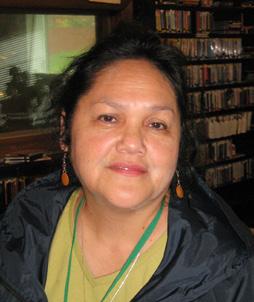
Prepared the Kaatslitaan Dance Group to provide a virtual welcome for the Vietnam Veteran’s Ceremony.
Participated in Healing Blanket Welcome with the SouthEast Alaska Regional Health Consortium (SEARHC).
Delivered snack bags, in collaboration with Elders, to all JOM students that were home due to COVID-19 community mandates.
Hosted Shadow Box Theater for National Native Heritage Month.
Provided winter gear to all JOM students.
The Navigators is a relationship-based prevention and early intervention program that serves Native youth ages 13-27. The program provides opportunities that help youth navigate through adolescence into adulthood focusing on healthy relationships, cultural connectedness, learning life skills, and providing academic support, independent transitioning, and leadership opportunities.
Provided full services during the pandemic, including limited in-person services when approved and deemed safe.
Provided services to 192 tribal youth through an increased variety of workshops and activities (e.g., Adulting 101, Compass Gatherings, Study Groups, Scholarship Workshops, #TongassTime, Youth Commission) which exceeded 2021 goal by 32.
Assisted in the development of the Tlingit & Haida Youth Commission and successfully hosted the first Tlingit & Haida Youth Summit. Youth Delegates developed two resolutions for the 86th Annual Tribal Assembly:
» Making Alaska Native Language Classes















Mandatory for K-12 State of Alaska Public Schools, and
» Increasing Awareness & Indigenous management as a Means of Combating Climate Change.
Hosted 3rd Annual Navigators Camping event (virtually this year) and an end of year holiday parade for Navigators students.
Hosted Operation Haw’aa to thank local essential and frontline workers; thank you posters and hundreds of treats were delivered to 14 locations.
Co-hosted Juneau Youth Pride Party with Zach Gordon Youth Center and other partners. The successful event brought together approximately 45 prideful youth.
Partnered with Zach Gordon Youth Center and community partners to host Caring for Yourself, Caring for Your Community Camp serving 12 youth.
Provided 60 Juneau School District students with bus passes to attend summer school.
The Vocational Training & Resource Center (VTRC) is a tribal enterprise and State of Alaska postsecondary authorized institution that provides distance education and vocational classes for career certification.
In 2021, the VTRC added six new courses to the course offerings list: First Aid/CPR/AED, Child Development Associate certificate, Business Basics, Financial Skills, Work Readiness & Soft Skills and Administrative Assistant Level 1.
160-hour Administrative Assistant Level I in collaboration with Northern Industrial Training (six students enrolled and completed).
Hosted an 8-week intensive Child Development Associate (CDA) Certificate Boot Camp in collaboration with AEYC and the Tribe’s Child Care department; 18 students completed the courses and received CDA certification.
Provided First Aid, CPR, AED classes to 30 students.
Provided Online Flagger Certification, 40-Hour HAZWOPER, and 8-Hour HAZWOPER Refresher classes in addition to continuing to offer Penn Foster online courses.
Increase Navigator programming to serve up to 225 youth and expand services beyond Juneau.
Review Higher Education policies and procedures to ensure they are current and reflect Tlingit & Haida’s position of supporting students to our greatest ability during their education journey.
Explore opportunities to develop an early childhood education campus.
Apply for funding to support sustainable operation and expansion of Haa Yoo X̱ ’atángi Kudi.
Develop partnerships to support and reach more students with new JOM position at Thunder Mountain High School.
Work with Communications and marketing firm on the branding and marketing of the VTRC.
Continue to develop and implement training opportunities to meet the workforce and training needs for tribal citizens.
The Cultural Heritage department oversees the coordination of Tlingit & Haida’s cultural and educational activities. The department is housed under the Cultural Heritage & Education Division and promotes language revitalization and arts programs to ensure the existence and perpetuation of our languages and unique cultural practices.
Cultural Heritage collaborates with Elders, language scholars and educators, culture-bearers, artists, universities, and community partners to maximize resources.
Cultural Heritage offers virtual and in-person workshops by master artists and cultural practitioners in a variety of artistic practices. The goal of the department is to provide opportunities to all tribal citizens to ensure the language and ways of life of our grandparents continues.
In 2021, the department achieved its goal of developing and hosting regular cultural heritage classes with full enrollment.
Awarded $175,000 from Sealaska Language Endowment Fund to continue the Increasing Fluency project to support six intermediate/advanced learners (two Lingít, two Xaad Kil, and two Sm’algyax language scholars).
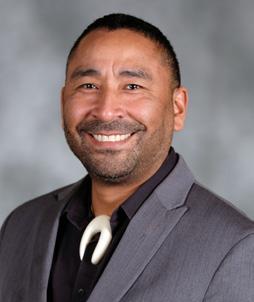
Hosted weekly ELAN training sessions for 12 intermediate to fluent language teachers and learners.
Supported the Indigenous Sustainable Harvesting Plant Symposium for 20 tribal citizens and staff.
Hosted a 25-hour Sm’algyax Grammar Intensive for 20 language learners in partnership with Kitsumkalum First Nation.
Provided support to Alaska Native Indigenous Training Academy (ANITA) summer camps in Sitka, AK and Seattle, WA.
Developed eight Gumboots Go! episodes, a children’s video series rooted in Tlingit & Haida languages and ways of life, with support of the Tribe’s Child Care department.
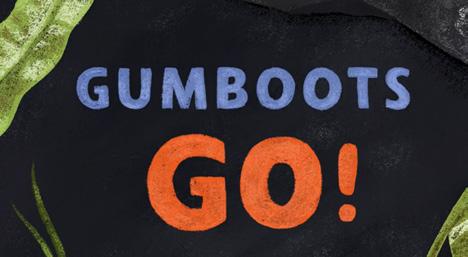
Awarded an Institute of Museum and Library Services Native American Basic Library grant of $10,000 to support expansion and growth of the Tribe’s library collection.
Collaborated with Goldbelt Heritage Foundation to provide a Traditional Button Robe class for 10 tribal citizens in Juneau, Alaska.
Began developing a Traditional Food Harvesting video series with Prince of Wales Island tribal citizens and communities to create culturally responsive educational resources for school districts and children.
Hosted I Toowú Klatseen (Boys & Girls Run) activities in collaboration with community partners. A total of 106 students participated – 87 from the Juneau School District and 19 in the communities of Yakutat and Hydaburg.
Co-hosted a Cedar Hat Weaving class at the Prince of Wales Vocational and Technical Education Center for 22 tribal citizens.
Hosted a series of virtual classes with Tsimshian Cultural Practitioner Abel Ryan who taught Fundamentals of Formline Design, Northwest Coast Drum-Making, Intermediate Level Formline Design, and Introduction to Painting. A total of 65 individuals participated.
Hosted a series of virtual classes with Tlingit Weaver Lily Hope who taught students how to weave Chilkat Protector Masks and Ravenstail Pendants. A total of 40 individuals participated with 17 who planned to continue classes with Lily Hope through her Patreon platform.
Collaborated with community partners and provided extensive support for the inaugural Rock Aak’w Indigenous Music Festival.
Collaborated with the Tribal Family & Youth Services (TFYS) department to provide Haa Aaní Summer Adventures that offered culturally based STEAM curricula, traditional harvest, and outdoor adventure activities for 21 students in the 2nd through 8th grade.
Collaborate with tribal departments and community partners to provide increased cultural education opportunities for students at Juneau School District high schools.
Advocate for Tlingit language classes to be offered during regular school hours to improve equity and accessibility for the local Indigenous language offerings.
Increase cultural and language opportunities and resource creation for tribal citizens of all ages and locations.
Continue building upon Gumboots Go! series and complete Traditional Foods Harvesting video series.
Develop and launch Southeast Indigenous Languages Digital Archive.
Tlingit & Haida Head Start is a Region XI, American Indian/Alaska Native (AI/AN) program federally funded to serve 262 preschool-aged children (3-5 years old) in 10 communities throughout Southeast Alaska.
» Angoon: 1 class
» Craig: 1 class
» Hoonah: 1 class
» Juneau: 5 classes
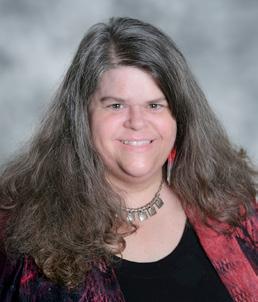
» Klawock: 1 class
» Petersburg: 1 class
» Saxman: 1 class
» Sitka: 2 classes
» Wrangell: 1 class
» Yakutat: 1 class
Head Start is a comprehensive preschool program that partners with families to foster healthy child development. In addition to preparing children to enter kindergarten, the program also coordinates health screenings (dental, health, mental health, and nutrition), and monitors students’ development and parent involvement.
Head Start is administered in collaboration with the Tribe’s governing body (Executive Council) and the Policy Council which is mostly comprised of current Head Start parents. Each class operates with the input of their local parent committee.

In 2021, Head Start operated with a budget of $4,749,166. The program was funded with $3,847,435 in federal Head Start funds, which was the final year of a five-year continuation funding cycle. The program received one-time funding through the American Rescue Plan Act for $313,483. Head Start also received $479,789 under the State of Alaska’s Department of Education and Early Development (DEED) and was reimbursed $108,459 under the Child and Adult Care Food Program (CACFP) for meals and snacks.
Enrolled 181 students in the 2020-2021 school year.
» 63% of total enrollment were income or categorically eligible and 37% were considered over-income.
» 36% of the total enrollment were first-year students, 55% of students were second-year students, and 9% were three-year students.
Reached 69.16% Average Daily Attendance (ADA) for the days class was held virtually with all classrooms closed to in-person attendance due to the COVID-19 pandemic.
Completed the following health screenings for all enrolled students:
» Dental (91%), Hearing (76.77%), Physical (88%) and Vision (88%).
» Of all enrolled students, 92% were current on immunizations.
Received fluoride treatments through the SouthEast Alaska Regional Health Consortium (SEARHC) Dental Clinic for Head Start children.
Provided students with 11,955 breakfasts, 12,097 lunches and 1,114 snacks during the 2020-2021 school year. These numbers reflect only the meals reimbursed through the CACFP.
Increased cultural activities in Juneau classrooms by participating in Haa Sh Kalneegí | Our Story, a culturally responsive educational resource.
Continued partnership with Goldbelt Heritage to provide Lingít language and cultural activities.
Implemented Conscious Discipline curriculum for all classrooms.
Successfully completed the Head Start FY 21 Phase 2 monitoring review without any findings or deficiencies.
Developed a partnership with Craig School District to provide classroom space and meal service for Head Start children.
Received approval from the Executive Management Team to increase pay for Head Start teaching staff during the pandemic as funds allow.
Completed Craig Head Start building renovations, installed vinyl siding to Wrangell Head Start building, installed exhaust vent in Saxman classroom, and repaired furnace at William G. Demmert Head Start Center.
Supported the professional development of Head Start staff:
» Child Development Associate Credential (3), CACFP Food Professional Certification (1), Certified Food Program Managers Certificate (1), Child Development Associates Credential Intensive (7), Early Childhood Education degree through the University of Alaska (5 enrolled), and CLASS Reliability Certification (1).
» Provided Cultural Sensitivity training to all staff.
Increase the effectiveness and efficiency of program operations.
Continue to provide safe, healthy and child-friendly environments.
Strengthen the cultural foundation through cultural programming, community engagement and cultural values.
The Human Resources (HR) department is responsible for maintaining the Tribe’s employee classification structure and personnel files, recruiting to fill vacancies, screening applications, and referring candidates to hiring managers.
Approved 97 position descriptions and posted 165 recruitments.
Screened a total of 1,458 applicants that resulted in 171 new hires. This is a significant increase over 2020 statistics (619 applicants and 74 hires).
Increased visitors to BambooHR recruitment website from 28,813 in 2020 to 209,627 in 2021.
Presented a compensation study to the Executive Management team. Final roll-out will occur in 2022.
Increased recruitment efforts by hosting a Job Fair at the Mendenhall Mall in Juneau, AK and by providing outreach at the 477 Division’s Job Fair.
Tracked over 400 employee COVID-19 vaccination cards.
Provided staff with training on use of classification/compensation tool.
Increased HR staff development: three HR staff attained Tribal Human Resources Professional certification.
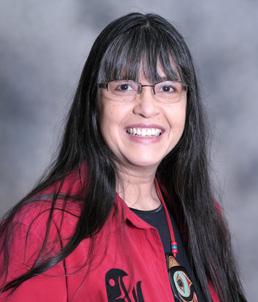
Participated in a Facebook Live Lunchtime Chat to increase awareness of employment opportunities and employee benefits at the Tribe.
Hired a HR Coordinator.
Develop desk procedures for the department.
Update orientation packet to include current HR reference material.
Implement the new ALERA compensation plan and administration processes.
Complete restructuring of the Human Resources department and assume administration of employee benefits.
The Information Technology (IT) department oversees the Tribe’s information technology systems and administers the Local Area Network (LAN) and Wide Area Network (WAN) which allows all departments to communicate with each other more efficiently, including those employees located in field offices throughout Southeast Alaska. The department also provides troubleshooting and technical support to all staff for computers and electronic office equipment.
Provided staff with technical support and closed 2,489 help desk tickets.
Configured and deployed 268 workstations. The number of user accounts increased from 299 in January to 407 by year end.
Redesigned WAN routes and added additional VPN access points to increase access speed to file servers located at different buildings.
Implemented a security event manager to provide a central monitoring system for all server and firewall security events.
Purchased access to over 6,000 hours of online IT courses and labs. This will allow IT staff to keep their skills up to date, as well as pursue industry standard certifications.
Installed a Lansweeper server that gathers hardware and software information from computers and other devices on our network for asset management, compliance, and audit purposes.

Installed new Cisco Meraki network equipment at most of the Tribe’s Juneau facilities (Andrew Hope Building, Anka Street property, Edward K. Thomas Building, First Bank Building, Southeast General Contractors, Tribal Emergency Operations Center, and Vocational Training & Resource Center).
Migrated the controllers for network switches and routers to a single cloud hosted controller to allow for site management if WAN links go down.
Implemented a new Remote Authentication Dial-In User Service (RADIUS) server to facilitate authentication when connecting to our wireless and wired networks as an added security layer.
Added increased layers and rules to our cybersecurity model to safeguard our network and data.
Installed routers/firewalls, switches, and wireless access points at all three non-congregate shelters.
Installed new network and phone system in Klawock Field Office.
Completed the implementation of multi-factor authentication (MFA) to increase the security of our network accounts. MFA is reported to stop 99.9% of account compromising attacks.
Implemented a new Office 365 cloud-based backup solution to increase speed and reliability. Data is encrypted before being transmitted and is stored in an encrypted format.
Assisted with the Sealaska CARES program. Three IT staff worked in customer service roles to help with the high volume of applications.
Migrate the Tribe’s phone system from existing Digium Switchvox server to the Cisco Webex Calling cloud-based phone system.
Replace existing antivirus software with Cisco Secure Endpoint.
Implement LastPass password management software for all employees.
The Native Lands and Resources (NLR) department manages and provides services that enhance and protect the land, environment, cultural artifacts, and Veteran benefits. NLR consists of Realty, Forestry, Transboundary and Climate Change programs funded by the Bureau of Indian Affairs (BIA) Compact; the Indian General Assistance Program (IGAP), State Tribal Response Program (STRP), and Preparedness and Disaster Resiliency funded by the Environmental Protection Agency (EPA); Cultural Resources program funded by the National Park Service (NPS); and the Indigenous Guardians program funded by the United States Forest Service (USFS) and the Veterans program.
In 2021, the NLR department focused on water quality monitoring on transboundary rivers, harmful algae bloom studies, Socio-Economic Adaptation Plan, Indigenous Guardians program, Alaska Native Veteran benefits, management of Native allotments and townsite lots, the probate of restricted estates, and the repatriation of cultural artifacts.
The Cultural Resources program repatriates objects of cultural patrimony, sacred objects, funerary objects, and human remains in accordance with the Native American Graves Protection & Repatriation Act of 1990 and the National Museum of the American Indian Act of 1989. These acts allow federally recognized tribes to repatriate items from museums and federal agencies.
Updated and submitted five claims to the National Museum of the American Indian (NMAI) and one claim to the Oakland Museum of California.
Repatriated the Kadashan Mortuary Pole from the Princeton University in New Jersey. The funerary object was collected by Reverend Sheldon Jackson of the Presbyterian Missions in Alaska in 1879.
Repatriated the Thunderbird Screen from the Los Angeles County Museum of Art in California.
Entered into a loan agreement with the de Young Museum in San Francisco, California for the Thunderbird Screen.

Conducted virtual consultations with the Detroit Institute of Arts in Michigan and the Metropolitan Museum of Art in New York.
Participated in a consultation hosted by the Denver Museum of Nature & Science in Colorado to review and provide input on Tlingit objects for conservation methods in accordance with museum standards.
Secured contract and started construction of an Artifact room that will house all repatriated objects.
Awarded funding in the amount of $89,140 from the National Park Service for consultations with the Portland Art Museum, Indiana University Museum, and Evansville Museum.
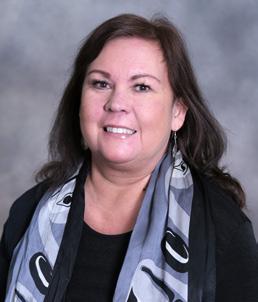
The Environmental & Natural Resources program assists Southeast Alaska tribes and communities in developing environmental and natural resource awareness. The program provides training activities, educational assistance and coordination of statewide projects. Projects include climate change, transboundary river sampling, and subsistence activities.
Completed construction of the greenhouse and received funding in the amount of $125,000 to continue ongoing efforts to sustain the greenhouse to promote food grown locally while educating communities on clean eating and supporting a more resilient and subsistence way of life in Southeast Alaska.

Hosted a virtual Southeast Environmental Conference with over 60 participants representing Southeast Alaska tribes, Southeast Alaska Native Claims Settlement Act corporations, tribal organizations, state and federal agencies, and natural resource and environmental professionals.
Completed the COVID-19 Survey in partnership with the Sitka Sound Science Center to gain a better understanding of how Southeast Alaskans perceive the risk of COVID-19 to address policy change.
Hosted a virtual Disaster and Resiliency Expo with over 80 participants and 15 partner organizations.
Entered into an agreement with Spruce Root for the Alaska Youth Stewards program.
Collected a total of 34 water samples in Juneau, Alaska (17 from Auke Bay, 2 from Point Louisa, and 15 from Amalga Harbor) for the study of harmful algae blooms.
Continued to raise tribal awareness on climate change issues and transboundary mining activities.
Developed a Socio-Economic section to the Climate Change Adaptation Plan.
Joined the Alaska Climate Adaptation Community of Practice organization to provide climate change support to Alaska.
Established a Climate Change committee with the Executive Council.
Conducted 22 water quality samplings which included sediment samples (2 on the Alsek River, 10 on the Chilkat River, and 10 on the Klehini River). This is the sixth year of sampling.
Received $200,000 in funding from the BIA to continue transboundary water quality samplings.
The Indigenous Guardians Network is a partnership formed in 2020 between the U.S. Forest Service (USFS) and Tlingit & Haida to support Alaska Native communities and tribes through the creation of the Indigenous Guardians Network. The partnership incorporates Traditional Ecological Knowledge in the protection, preservation, restoration, and management of traditional homelands and waters.
Amended the Cost Share Agreement with the USFS to add an additional $155,000 for the Indigenous Guardians program to benefit Southeast Alaska tribes.
Held the first Indigenous Guardians Gathering that included Southeast tribes, Sealaska, Spruce Root and other entities.
Created the Indigenous Guardians Network Charter.
The Realty program provides professional land management to Native landowners who own trust/ restricted properties. Individuals owning Native allotments receive services and consultation in forestland management through the Forestry program.
Processed 14 land conveyances, allotment adjudications, Last Will & Testaments, and probate of estates for restricted property owners.
Received $110,000 to begin a Tree Thinning project on Native allotments in the Summer of 2022.
Submitted a Fee-to-Trust application to the Bureau of Indian Affairs.
The Veterans Allotment and Benefit program was authorized by the Executive Council to assist Alaska Native Veterans seeking a Native allotment in accordance with Alaska Native Vietnam-Era Veterans program authorized under the Dingell Act of 2019.

Conducted virtual and in-person meetings on the Alaska Native Vietnam Veteran application and mapping process.
Hosted an Alaska Native Vietnam-Era Allotment Veterans meeting in Haines/Klukwan.
Developed a virtual application and mapping process to present to Veterans for their applications.
Actively researched grant opportunities to sustain the Veterans program.
Implement a recycling program for Tlingit & Haida facilities.
Enter into co-governance agreements with the USFS.
Finalize agreements with the USFS for the Southeast Sustainability Strategy.
Complete the United States Department of Agriculture Southeast Alaska Tribal Conservation District Bylaws.
Begin outreach to Southeast Alaska tribes for the Indigenous Guardians Network.
Implement the Alaska Youth Stewards program.
Finalize the partnership agreement with the Sitka Sound Science Center for the Landslide project.
Enter into an agreement with the U.S. Department of Veterans Affairs for the Veterans program.
The Office of the General Counsel provides professional legal counsel to the Tribe in the areas of tribal government, federal-tribal relations, jurisdiction issues, environmental and natural resources law and policy, economic development, tribal business enterprise, and employment issues.
The General Counsel provides direct oversight of the Child Support attorney, two Child Welfare attorneys, and two Staff Attorneys.
Continued to serve as the Legal Officer to the Tribal Emergency Operations Center (TEOC), providing legal updates and counsel. With the passage of the American Recovery Plan Act, a big focus shifted to compliance with its requirements, which differed from the Coronavirus Aid, Relief, and Economic Security Act (CARES) Act.
Provided support and legal advice to the Rescue Relief Household and Rescue Small Business Grant programs regarding many unique circumstances of individual families and small businesses.
Oversaw litigation that has allowed the Tribe to maintain its conditional use permit for the operation of non-congregate sheltering for the re-entry population at the facility located on Alaway Avenue.
Supported the Tribe’s participation in litigation to halt the sale of the Seattle National Archives facility.
» The Tribe and other plaintiffs won a motion for a preliminary injunction to immediately and temporarily the sale.
» The federal government reversed course and withdrew the sale.
Monitored and reported regarding Yellen v. Confederated Tribes of the Chehalis Reservation, which asked the U.S. Supreme Court to decide whether Alaska Native Corporations (ANCs) were “Indian Tribes” for purposes of the CARES Act.
» The U.S. Supreme Court decided ANCs were Indian Tribes for that purpose.
» As a result, $450 million in CARES funding originally set aside for Alaska was distributed to Alaska Native Corporations.
Participated in review, along with outside counsel, of Judicial Complaint Process outlined in Section 4 of the Tribal Rules of Judicial Conduct. New forms and template letters have been drafted for use by the Judiciary Committee to support consistency across the process.
Monitored and facilitated the Tribe’s participation in Brackeen v. Haaland (formerly Brackeen v. Bernhardt).
» Fifth Circuit Court of Appeals, en banc, issued its decision rehearing the case and held that the Indian Child Welfare Act (ICWA) is constitutional, while striking down three provisions for unconstitutionally commandeering state governments.
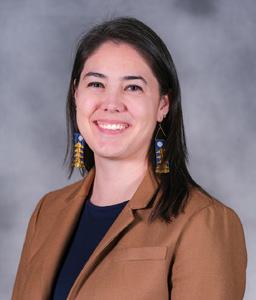
» All parties have requested the decision be reviewed by the U.S. Supreme Court.
Worked with the Human Resources Director and Chief Operating Officer in drafting the Tribe’s mandatory vaccination policy which was implemented on August 25, 2021.
Supported the Tribe’s newly formed Youth Commission:
» Met with the Youth Commission on several occasions to support drafting of the Commission’s bylaws.
» Provided a presentation on Tlingit & Haida history, from time immemorial through the present.
Worked with the Office of the President to review, number and format resolutions that were submitted for consideration at Tribal Assembly. Resolutions were distributed to Delegates on September 20, 2021.
Present a draft probate code to the Executive Council for consideration.
Revise and draft key compliance procedures, including for elections.
Complete amendments to Title 06 – Tribal Courts.
Monitor and support the City & Borough of Juneau’s development of a fireworks control ordinance.
Support the drafting, adoption and implementation of policies for compliance with 42 C.F.R. Part 2, which governs the protection of records regarding substance use disorder diagnosis, treatment and referrals.
The Office of the President provides direct support to the President and serves as a liaison to Delegates and the Executive Council to ensure the policies set forth by the Tribe’s governing body are implemented in a timely manner. The directives established by the Tribal Assembly and Executive Council are implemented through the planning, organizing, and coordinating of governmental and administrative operations by working directly with the Tribe’s administrative officers and managers.
The Office of the President fosters collaborative relationships with statewide and national organizations and coordinates intergovernmental activities through management and coordination of federal, state, municipal and tribal relations to protect and promote the Tribe’s interests.
Prepared public comment, written testimony, reports, talking points and presentations for the President to address important issues on the local, state, and national levels through representation, testimony, and advocacy. Key testimonies prepared include, but are not limited to:
» Testimony on SB 81 “An Act requiring background investigations of village public safety officer applicants by the Department of Public Safety; relating to the village public safety officer program; and providing for an effective date” to the Community and Regional Affairs Committee.
January - November
» Testimony on HB 118 “An Act relating to state identifications and driver’s licenses for persons in the custody of the Department of Corrections; relating to the duties of the commissioner of corrections; relating to living conditions for prisoners; and providing for an effective date” to the House Tribal Affairs Committee.
» Testimony on HB 123 “An Act providing for state recognition of federally recognized tribes; and providing for an effective date” to the House Tribal Affairs Committee.
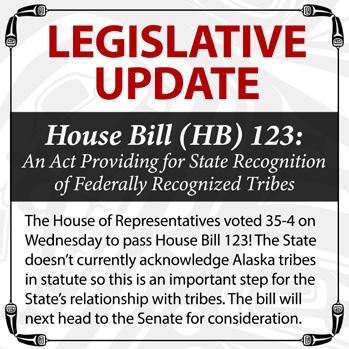
» Testimony on HB 184 “An Act requiring state participation in a tribal child welfare compact” to the House Health and Social Services Committee.
» White House Tribal Nations Summit panel on Housing, Energy and Infrastructure.
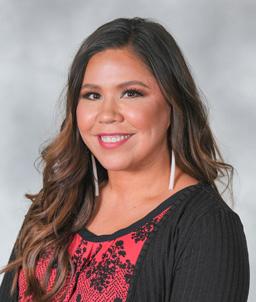
Continued to serve on the Tribal Emergency Operations Center team facilitating communication with outside agencies and providing timely, integrated and coordinated response to the COVID-19 pandemic to protect the wellbeing of Tlingit & Haida’s citizens, clients, employees and communities.
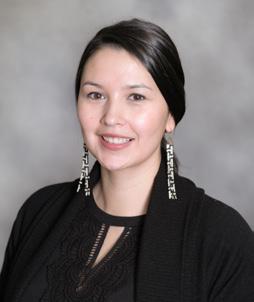
Advocated to protect the Power Cost Equalization in perpetuity; letters were sent to all Southeast Alaska Legislators and the Alaska Joint Fiscal Plan Working Group.
Hosted the Tribe’s first virtual Executive Council Town Hall meeting via Facebook live to engage tribal citizens and increase outreach on current advocacy efforts on subsistence rights, Missing and Murdered Indigenous Persons, climate change and resilience, and transboundary mining; over 2,000 citizens viewed the town hall meeting.
Advocated for changes within the structure and financial processes of the State of Alaska’s Department of Public Safety (DPS) to benefit the Village Public Safety Officer (VPSO) program and empower VPSOs to better serve our citizens. Met with DPS Commissioner Cockrell to discuss the VPSO programs and opportunities to strengthen the relationship between the DPS and VPSO contractors.
Participated in the White House Tribal Nations Summit. As an Infrastructure, Housing, and Energy panelist, President Richard Chalyee Éesh Peterson shared some of Tlingit & Haida’s priorities and spoke about the enactment of the bipartisan infrastructure framework, as well as the Build Back Better framework, and how it will take a focused large scale federal effort to restore and liberate Indian country from the decades of accumulated unmet needs.
Participated in tribal consultations with U.S. Department of Agriculture (USDA) and U.S. Forest Service (USFS) on the Alaska Roadless Rule and the Administrative Procedures Act Petition which requests the establishment of a Traditional Homelands Conservation Rule to protect traditional homelands.
Coordinated and recorded the minutes of 14 Executive Council meetings.
Conducted polls to coordinate the Executive Council’s review of 71 resolutions.
Worked with Tlingit & Haida Community Councils to establish offices in Seattle and Anchorage.
Developed Community Navigator positions to serve as a local resource to tribal citizens in our communities.
Work closely with Southeast Alaska tribes and Compact communities to provide regional trainings and capacity building.
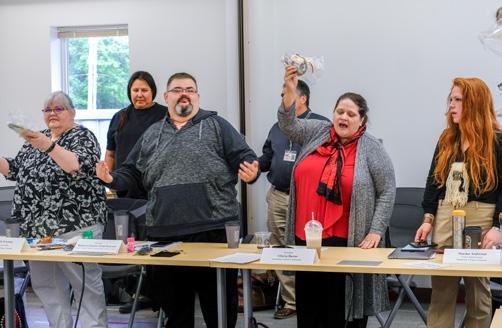
Work with Tlingit & Haida’s Executive Leadership to coordinate quarterly administrative professional’s meetings to invest in our staff and develop on the job skills.
Work closely with Tlingit & Haida Community Councils and elected Delegates to engage in governance of the Tribe.
The Organizational Development department works with leaders across the organization to identify issues, facilitate dialogues, and build agreement and readiness for necessary change to best serve the needs and wants of our citizens.
Tlingit & Haida strives to be an ever-changing collective and collaborative entity that strengthens its sovereignty through enhanced economic strength and opportunity. This is accomplished by involving many voices, ideas and delivering value-added services. These values are learned from our ancestors and make our adaptive, collective resilience as Native peoples an explicit part of our organizational DNA.
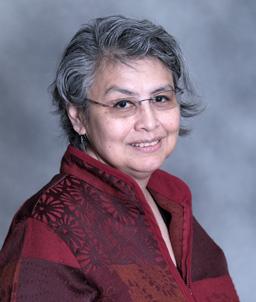
Led TribeVue initiative to finalize training materials and identify top three to five (3-5) projects with management team.
Co-created leadership development with the Tribe’s management team. With collective attention, 18 leadership development sessions were held in 2021, including topics such as agreeing on behaviors around Kotter’s Eight Step Change model to looking at the challenges of remote work.
Collaborated with a target group of managers to conduct Learning Management System (LMS) research to identify a system that best aligns with Tlingit & Haida’s training needs. Three platforms were tested and a LMS was selected to use and build out for a launch in 2022.
Started development of Managing Conflict of Interest training that will be implemented through the Tribe’s new LMS.
Facilitated a strategy session with Tlingit & Haida’s Youth Commission. The issues raised included decolonizing T&H, supporting and learning our Subsistence Lifestyle, and taking care of our elders and youth.
Co-create LMS content to meet the Tribe’s training needs.
Develop and implement a collective leadership assessment process and support creating customized learning plans for leaders, serving as a coach to each manager as needed.
Create measures of growth in employees, capacity, and funding.
The Program Compliance department monitors and addresses client service programs for compliance, including handling program appeals or client complaints, and administers the Tribal Enrollment program which identifies and certifies tribal citizens. The department also provides technical assistance to Tlingit & Haida’s Community Councils and Southeast Alaska Indian Reorganization Act (IRA) tribes on enrollment and tribal elections.

Restored 25% of all tribal enrollment record hard files which included cleaning all files of only pertinent records and creating new file folders with updated labels.
Prepared tribal enrollment records for digitization after clean-up of hard files.
Reviewed and documented errors in data conversion from RiteTrack database to TribeVue data management system.
Sent letter to tribal citizens with a null (blank) or other in voting community. Updates continue to come in with correct voting community.
A client who is not satisfied with the service he or she received from a Tlingit & Haida program may submit a written complaint. All complaints are taken seriously and are reviewed and responded to.
Addressed 16 formal complaints in 2021. Interviews were conducted with staff followed by meetings with supervisors and/or managers to resolve complaints.
Reviewed customer service-related complaints (e.g., phone calls not being returned or employee conduct) and addressed each with their supervisor and/or the Human Resources department.
The Tribal Enrollment program maintains Tlingit & Haida’s tribal citizen enrollment records and enrolls those persons of Tlingit and/or Haida descent into the Tribe. Services include certifying tribal enrollment, correcting blood quantum records, and issuing tribal photo identification (ID) cards and certification and verification letters for enrolled citizens. Relinquishment and disenrollment actions are also held and reviewed by the Tribal Enrollment Committee.
A Tribal Enrollment committee appointed by the Tlingit & Haida President is authorized to certify new tribal citizens, act on relinquishment and disenrollment requests, and make corrections to citizen records. In 2021, two enrollment committee meetings were held.
Coordinated two successful on-site Tribal Enrollment committee meetings.

» The committee approved 1,553 enrollment applications, 15 relinquishment requests, and 7 blood quantum corrections. No disenrollment actions were taken.
Received a significant increase in enrollment applications due to the Coronavirus Aid, Relief, and Economic Security (CARES) Act and American Rescue Plan Act (ARPA) financial assistance programs provided to tribal citizens affected by the COVID-19 pandemic.
Created tribal enrollment population demographic reports at the request of Tlingit & Haida Community Councils for their services being offered under the ARPA program.
Facilitated elections for two Associate Justices, an Emerging Leader, and a Delegate/Citizen of the Year during the Tribe’s 86th Annual Tribal Assembly using SimplyVoting, an electronic voting software program.
Provided tribal enrollment information to Tlingit & Haida Community Councils who have a standard service agreement with Tlingit & Haida to assist in updating enrollment data in their community.
Held several virtual tribal enrollment training sessions to ensure staff working remotely maintain proper procedures during the COVID-19 pandemic.
Ella Bennett Chair
LaVerne Wise, Vice-Chair
Stephanie Rainwater, Secretary
Judy Helgesen, Member
Frank Wright, Member
Patricia Alexander, Member
Restore 40% of tribal enrollment record hard files by cleaning all files of only pertinent records and creating new file folders with updated labels.
Prepare tribal enrollment records for archiving after clean-up of hard files.
Research and clean data conversion errors from RiteTrack database to TribeVue data management system.
Obtain funding for the Enhanced Tribal ID.
Remove 20% of null (blank) or other in voting community to current address and correct voting community.
Implement staff development plans to increase efficiency in the areas of writing skills, proofreading, budgeting, and data management.
Tlingit & Haida’s Public Safety Division aims to protect and serve employees, tribal citizens and communities by providing a safe and healthy work environment, public safety services to communities in Southeast Alaska, drug education to first responders, and helping communities develop and implement local emergency preparedness plans to respond to disasters.
The Public Safety Division provides direct oversight of the following programs and departments:
» First Responders – Comprehensive Opioid Addiction & Recovery Program
» Office of Emergency Management (OEM)
» Village Public Safety Officer (VPSO) Program
» Occupational Health & Safety
Participated in Tlingit & Haida’s Lunchtime Chats Facebook live session to expand VPSO outreach on social media; over 70 viewers tuned in.
Successfully chaired statewide working group meetings that discussed VPSO program needs.
Provided testimony in support of the VPSO program to legislators on three occasions.
Coordinated the distribution of over 2,000 Elder holiday gift packages with canned king salmon, jam, blueberry tea, lap blanket and safety supplies to help support our Elders during the COVID-19 pandemic holiday season.
Worked with community partners and AmeriCorps service members to create and distribute over 1,000 youth COVID-19 safety kits to tribal youth.
Assisted Tlingit & Haida Community Councils in Anchorage, Petersburg, San Francisco, and Seattle with distributing food and safety supplies to tribal citizen families.
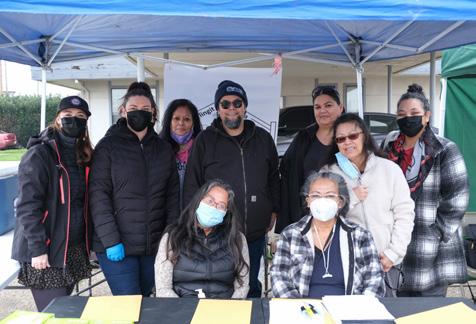
The First Responders – Comprehensive Opioid Addiction & Recovery program’s goal is to increase the capacity of VPSOs and other first responders in all Tlingit & Haida recognized communities to effectively respond to opioid overdose situations with emergency treatment through the administration of approved drugs or devices.
Hired Addiction & Recovery Coordinator and Administrative Assistant.
Identified medical professionals to participate in first responders training.

The VPSO program is administered in partnership with local municipalities and the Alaska State Troopers. The program provides rural Alaskan communities with public safety services such as search and rescue, fire protection, emergency medical assistance, crime prevention, and basic law enforcement. Additionally, the program trains and employs individuals residing in the village as first responders and was created to reduce the loss of life due to fires, drowning, lost person(s), and the lack of immediate emergency medical assistance in rural communities.
The following communities participate in the VPSO program with positions paid through Tlingit & Haida’s payroll system: Angoon, Hydaburg, Kake, Kasaan, Pelican, Saxman, and Thorne Bay.
Responded to over 1,800 incidents, surpassing the goal of 800+ responses in 2021.
Successfully completed State grant audit with no findings.
Secured approval on Pay Raise Proposal; State Commissioner awarded VPSOs a pay increase of $4.00 per Alaska State pay step.
Continued work with the VPSO Legislative working group to update and reorganize the VPSO program.
Continued VPSO professional development in the following areas: Alaska Law Enforcement Training (ALET) Academy, Emergency Medical Technician-2 (EMT-2), field training, Fire Academy, Hunter Safety Train the Trainer, taser training, and Training Assistance Counseling (TAC).
Implement mandatory First Aid, CPR, and AED training for staff.
Increase recruitment efforts to successfully place two VPSOs in each served community.
Increase VPSO staff development by providing two trainings per year.
Complete a community planning, consultation, and service model development plan for each Tlingit & Haida VPSO community.
Develop overdose intervention referral services between the VPSO/Tribal Family & Youth Services/ Tribal Courts and SEARHC for appropriate treatment and recovery within each VPSO community.
Develop an advisory council comprised of members who are engaged in efforts to prevent prescription drug/opioid overdose-related deaths and launch quarterly meetings.
Host an education session in each VPSO community to educate on “Good Samaritan” laws and how to administer FDA-approved overdose reversal drugs.
The Occupational Health & Safety (OHS) department uses a proactive approach to managing workplace health and safety through employee education, hazard assessments, and inspections.
The OHS department focuses on monitoring performance, evaluating outcomes to improve workplace conditions, and employee behaviors to build continuous progress to higher levels of health and safety achievements.
Hired an OHS Manager in November 2021.
Collaborated with the Community & Behavioral Services Division to prepare for their Commission on Accreditation of Rehabilitation Facilities (CARF) accreditation.

Reinstated building emergency evacuation drills.
Reviewed the status of the Andrew Hope Building Emergency Preparedness and Response Plan.
Drafted security guard policy and procedures.
Collaborate with facility management to ensure annual inspections of equipment are completed regularly with reports tracked and archived.
Develop a system for reporting occupational injuries, illnesses, and accidents.
Complete Hazard Assessment for job sites/duties.
Establish inspection protocols and checklists.
The Office of Emergency Management (OEM) was created to provide timely, integrated, and coordinated responses to emergencies. The OEM implements the four phases of emergency management:
» Mitigation
» Preparedness
» Response
» Recovery
These actions aim to protect the safety and well-being of Tlingit & Haida’s employees, clients, citizens, communities, and neighboring communities.
The OEM serves Tlingit & Haida’s 21 recognized communities and is funded through the Bureau of Indian Affairs Coronavirus Aid, Relief, and Economic Security (CARES) Act and American Rescue Plan Act (ARPA) and will continue to be funded beyond COVID-19 through Compact funding and other Federal Emergency Management Agency grants.
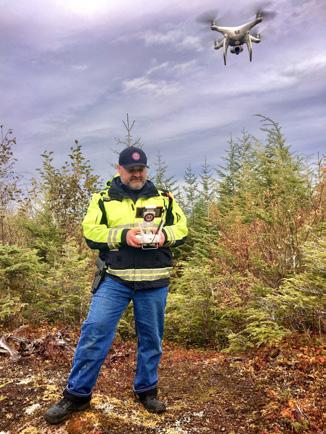

Developed and disseminated a COVID-19 Mitigation Plan for all employees.
Distributed over $500,000 in Personal Protective Equipment (PPE) to employees, clients, tribal citizens, and neighboring communities in response to the COVID-19 pandemic.
Participated in Valdez Rural Resiliency workshop.
Coordinated Employee Vaccination Incentive program; over 150 employees were vaccinated.
Hosted a tour of the Tribal Emergency Operations Center with the U.S. Coast Guard and new Command staff.
» Developed a memorandum of agreement with the U.S. Coast Guard to access and utilize their marine radio frequencies and to formalize a commitment to further developing partnership.
Established regular COVID-19 testing sites and hosted vaccination clinics for employees in Juneau, Alaska, and provided at-home testing kits to all employees by request.
Responded to 14 regional emergencies (five food distributions, four Search and Rescues, four water crises, and one PPE Delivery).
Initiated a work plan to provide an internal guidance structure to meet or exceed Federal Occupational Health and Safety standards.
Completed occupation site inspections at the Alaway and Vocational Training & Resource Center properties.
Secured, delivered and set up temperature kiosks in all Tlingit & Haida buildings.
Coordinated the installation of plexiglass sneeze guards in reception areas at Tlingit & Haida properties.
Collaborate with recognized communities to help develop eight small community response plans.
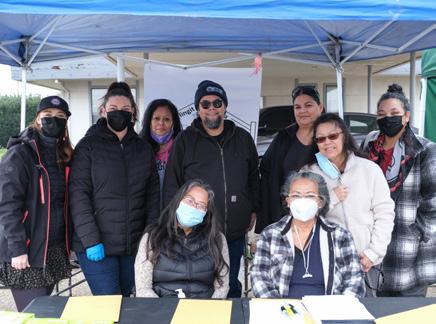
Develop and host four community partner public safety meetings.

Establish contact and offer assistance within 12 hours to all regional disasters and search and rescue efforts, including Seattle, San Francisco, and Anchorage.
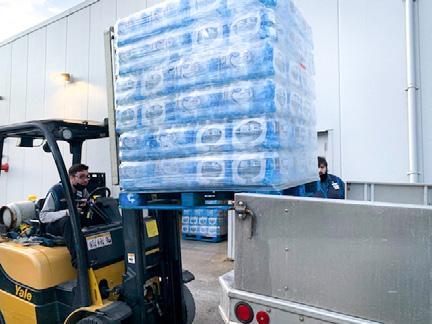
The Self-Governance department provides oversight of the Tribe’s Bureau of Indian Affairs (BIA) Self-Governance programs and provides support to Compact communities in compliance with applicable regulations and fiscal policies. The department also manages supplemental applications to tribal citizens and/or shareholders under the Coronavirus Aid, Relief, and Economic Security (CARES) Act in collaboration with Alaska Native Corporations (ANCs) and the American Rescue Plan Act (ARPA), as well as the newly formed Tlingit & Haida Operator Center.
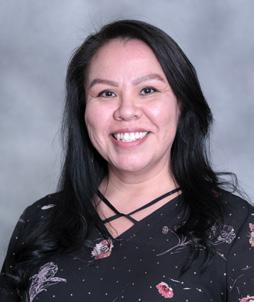 Khaá T’eix’
Helene Bennett Manager
Khaá T’eix’
Helene Bennett Manager
Through a Memorandum of Understanding (MOU), Southeast Alaska tribes can authorize Tlingit & Haida to enter into a Self-Governance Compact and Annual Funding Agreement (AFA) with the federal government to administer programs and services. Allocation of funding is calculated based on the Intertribal Distribution Worksheet which distributes tribal shares based on population for most programs and services with the exception of the Realty program, which allocates funding based on the number of Native allotments in each Compact community.
Self Governance also provides technical assistance and training opportunities to help tribal governments and programs find resources to increase their administrative capability, conduct elections and successfully perform their respective duties.
Conducted in person meetings with six of Tlingit & Haida’s 21 Community Councils to discuss ARPA funds set-aside for Tlingit & Haida Community Councils. Virtual meetings were held with 10 of the remaining communities due to COVID-19 related travel restrictions.
Launched an Operator Center with three receptionists in October 2021 to answer incoming calls to Tlingit & Haida’s main line during business hours. Operators will ensure each call is answered and that it reaches the appropriate program or department.
The Compact enables participating tribes to redesign programs, activities, functions, and services of the Bureau of Indian Affairs (BIA); to reallocate funds according to tribal priorities; and to enhance the effectiveness and long-term financial stability of their tribal governments. In 2021, participating tribes included:
Craig (ICWA, Social Services & Trust)
Haines
Juneau
Kasaan (Forestry, ICWA & Trust)
Ketchikan (Forestry & Trust Services)
Klawock
Pelican
Saxman
Skagway (Trust Services)
Tenakee
Wrangell
The Rescue Relief Household program launched in August 2021 to provide $1,000 per enrolled tribal citizen within an eligible U.S. household that has been impacted by the COVID-19 pandemic. The program is funded through the American Rescue Plan Act (ARPA) to offset expenses households are facing. The program provides a one-time payment and runs through 2024.
Hired and provided oversight of over 30 Rescue Relief Household program staff.
Assisted in developing the Rescue Relief application process and online application.
Administered the Rescue Relief Household program which distributed $12,082,000 in relief funds to tribal citizens directly impacted by the COVID-19 pandemic.
» Received a total of 16,873 Rescue Relief Household applications in 2021, of those, 12,082 were submitted for payment and 2,264 were incomplete or pending as of December 31st.
Tlingit & Haida partnered with Sealaska Corporation to distribute $6 million in CARES Act supplemental funding to provide up to 12,000 Sealaska shareholders impacted by the COVID-19 pandemic with a $500 relief payment. Applications were processed via an online application through MySealaska portal with funds dispersed by December 31, 2021.
Partnered with Sealaska Corporation to distribute their CARES funds to their shareholders impacted by the COVID-19 pandemic. $5,288,500 was distributed to 10,577 shareholders in 2021.
Tlingit & Haida partnered with Shee Atiká, Inc. to distribute $250,000 in CARES Act supplemental funding to provide up to 1,000 Shee Atiká shareholders impacted by the COVID-19 pandemic with a $250 relief payment. Applications were processed via an online application with funds dispersed by December 31, 2021.
Partnered with Shee Atiká to distribute their CARES funds to their shareholders impacted by the COVID-19 pandemic. $194,500 was distributed to 778 shareholders in 2021.
Develop a training schedule for Tlingit & Haida Compact tribes.
Provide regular technical assistance to the Compact tribes.
Administer the Community Navigators program.
Tidal Network is a new department that was developed in 2021 to lead the Tribe’s efforts to remove barriers and close the digital divide by providing increased broadband connectivity and speed throughout Southeast Alaska’s rural communities.

The department is focused on Tlingit & Haida’s broadband initiative to build out fixed wireless towers for the last-mile delivery of broadband services to Southeast Alaska communities ; partner with carriers for access and development of broadband to Alaska communities; promote existing options like America Connectivity Plan (ACP); incentivize competition and infrastructure, offer local support for networking and computing; make cybersecurity more accessible ; and provide education, endpoints, Customer Premise(s) Equipment (CPE), security, managed networking and local technical support to effectively utilize the internet for governance, education, healthcare, public safety and law enforcement, and economic development.
Participated in meetings with Tlingit & Haida Community Councils and Indian Reorganization Act (IRAs) tribes in Southeast Alaska to share information on the Tribe’s broadband initiative, seek support for the Tribe’s National Telecommunications and Information Administration (NTIA) grant applications, and discuss opportunities to partner under the 2.5 GHz wireless spectrum.
Participated in meetings with the Alaska Federation of Natives (AFN), Denali Commission, Sealaska, U.S. Senator Lisa Murkowski’s team, SouthEast Alaska Regional Health Consortium (SEARHC), Southeast Conference, and Southeast Conservation Council to form partnerships and secure funding.
Met with vendors and consultants to design, plan, build and use the 2.5GHz throughout Southeast Alaska for a WISP.
Built a consortium with seven (7) tribes and three (3) Native organizations to support the Tribe’s NTIA grant applications ($50 million) to build out a WISP in more than 20 communities and 30 locations in Southeast Alaska. The consortium includes:
» Chilkat Indian Village
» Craig Tribal Association
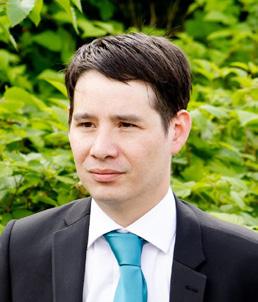
» Hydaburg Cooperative Association
» Klawock Cooperative Association
» Organized Village of Kasaan
» Sitka Tribe of Alaska
» Wrangell Cooperative Association
» Haida Corporation
» Sealaska
» SEARHC
Secured 2.5 GHz Rural Tribal Priority Window (TPW) license from the Federal Communications Commission (FCC) and received a broadband license.
Secured Internet Protocol version (Ipv)4, Ipv6 and Autonomous System Numbers (ASN) space from American Registry for Internet Numbers (ARIN).
Secured domain and continued work on branding development.
Started design, plan and build out of Wrangell, Alaska as a pilot for the WISP. Worked with Nokia, Pierson, Corenoc, realtors, and other consultants to identify locations and architecture of the WISP in Wrangell.
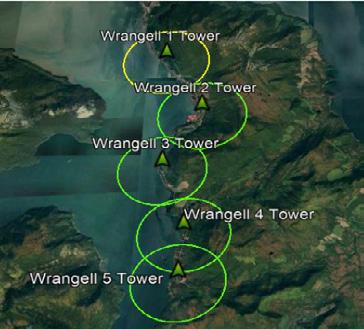
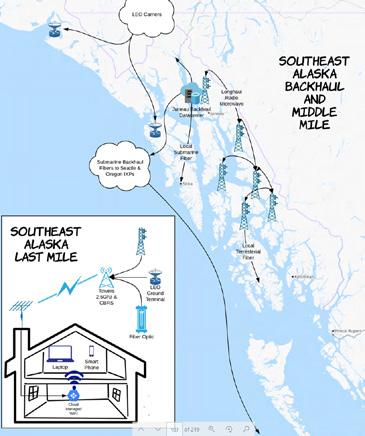
Attended two industry conferences to network with vendors and build relationships with other tribes outside of Alaska.
Received approval to expand department to include an administrative assistant, trainer, and coordinator.
Defend the 2.5 GHz spectrum within Tlingit & Haida’s shapefile and partner with other tribes to defend their 2.5 GHz using the Cell on Wheels (COW), tower leases, radio purchases and installations.
Design radio frequency and Internet Protocol Networks (IPN).
Purchase and stand-up COW, other required services, hardware, and software, as well as build the workforce to provide service.
Receive and allocate National Telecommunications and Information Administration Tribal Broadband Connectivity Program award throughout Southeast Alaska.

The Tribal Transportation department is organized to manage the dayto-day operations the Tribe has contracted through the Federal Highway Administration’s (FHWA) Tribal Transportation Program (TTP) for both Juneau and Saxman, Alaska.
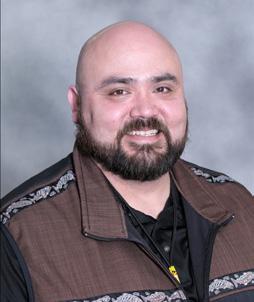
The Tribal Transportation department was established in 2005 along with other federally recognized tribal transportation programs throughout the region. Tlingit & Haida began contracting directly with FHWA’s TTP (formerly the Indian Reservation Roads Program) in 2009. Beginning with FY 2013, funds were distributed to tribes annually on a statutory formula-driven basis under the Moving Ahead for Progress in the 21st Century Act (MAP-21) legislation. Under new legislation, Fixing America’s Surface Transportation Act (FAST ACT), the department is still operating under that same funding formula. Tribal shares of TTP funds can be used for planning, design, construction, maintenance, and administration of the program. In 2021, the annual TTP funding from FHWA was $691,195 for Juneau and $65,176 for Saxman.
The Tribal Transportation department provides representation on state and national transportation issues. The department has been participating in the Southeast Conference, Alaska Marine Highway System (AMHS) Reform Project, and continues to collaborate with local agencies to improve, construct and maintain transportation routes the Tribe has identified as important and necessary.
Acquired new Bobcat S76 Skid Steer with snow blade, sweeper, bucket, and fork attachments to help maintain new and existing parking lots.
Developed a Fleet Maintenance plan to provide routine oil changes, tire rotations and light mechanical work for company vehicles.
Conducted regular monitoring of Tlingit & Haida’s parking lots which included cleaning, repairing and snow removal.
Relocated the Tribal Transportation office from 320 W. Willoughby Avenue to 1721 Anka Street to allow for increased space to house all company vehicles.
Installed parking lot striping and painted curb stops at all Juneau properties.
Initiated process to add the following properties to the Tribe’s road inventory: 2631 Channel Drive, 86.44 acres on North Douglas (Kowee Creek Subdivision), 1721 Anka Street, and 410 and 400 Willoughby Avenue.
Complete Riverside Drive road safety audit.
Complete construction of the Southeast Alaska Native Veterans Memorial Park.
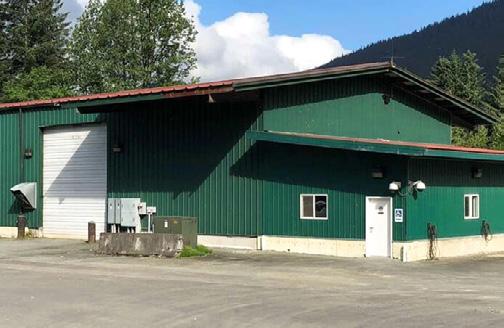
Obtain additional right of way access to the Tribe’s 86.44 acres of Kowee Creek Subdivision.
Complete updates to the Tribal Transportation department’s Bureau of Indian Affairs road inventory list.

Secure permit from U.S. Army Corp of Engineers to expand property 100’ on Southeast General Contractors tidewater property.
Pave the Organized Village of Saxman’s office parking lot.
The 477 Division creates a single, coordinated system of collaborative services that focuses on providing employment, training and related services to eligible Alaska Natives and/or American Indians within Tlingit & Haida’s service area.

The division’s mission is to create and maintain a comprehensive program to provide opportunities to clients through the provision of education, training and employment services. Our mission is carried out through the consolidation of federal education, training and employment programs and related services included in the Tribe’s 477 Plan. This plan demonstrates how we, as a tribe, integrate these federal program activities and services to improve their effectiveness and reduce unemployment in our communities as we meet goals that are in accordance with our strategic plan and the policy of self-determination.
Services are provided through a consolidation of funds under Public Law (P.L.) 102-477 which includes U.S. Department of Labor (USDOL) Workforce Innovation and Opportunity Act (WIOA) adult and youth; U.S. Department of Health & Human Services (DHHS) Native Employment Works (NEW); Tribal Temporary Assistance for Needy Families (TANF); Child Care Development Fund (CCDF); U.S. Bureau of Indian Affairs (BIA) General Assistance (GA) Program, Employability Assistance – Job Placement and Training (JPT) Program, Employment Assistance (EA), and Community Service Block Grant (CSBG). Non-477 departments under the 477 Division include the Tribal Vocational Rehabilitation (TVR) and Tribal Child Support Unit (TCSU).
Tlingit & Haida established a fully integrated 477 plan that incorporates all employment and trainingrelated funding sources into a seamless client service system that:
» Provides one universal application for services,
» Eliminates duplication of services, and
» Links client services through collaboration and referral.
The 477 Division has three purposes:
» Empower unemployed and underemployed tribal citizens;
» Improve the quality and effectiveness of services through integration and collaboration; and
» Increase self-sufficiency among tribal citizens.
Prioritized staff development and training to ensure the highest quality of services for tribal citizens.
» All 477 staff completed Customer Service and Phone Etiquette trainings.
» Managers of each department worked with their staff to identify professional development training opportunities.
Hosted a 477 All Staff meeting that focused on self-care during the COVID-19 pandemic.
Provided weekly online seminars to clients which included Résumé Writing, Interview Skills, Dressing for Success, and Time Management through a contract with Career Services Network, LLC.
Participated in local, state and national meetings and events throughout the year, some of which included:
» National 477 Tribal Workgroup (Member at Large) weekly Zoom meetings for:
• Annual National Indian and Native American Employment and Training Conference (NINAETC)/477 Conference planning, and
• Federal Report Forms – analysis and revision.
» Virtual NINAETC/477 Annual Conference (September 20-23).
» Virtual 477 Annual Meeting with federal partners, as required by P.L. 115-93 (September 16).
» National 477 Tribal Workgroup quarterly Zoom meetings.
Evaluate and streamline 477’s eligibility process and improve accessibility options for remote communities.
Continue to prioritize staff development & training to ensure the highest quality services for our tribal citizens
Continue to offer online options for job readiness training and tools.
Continue to collaborate with other tribal departments, including, but not limited to, Tribal Family & Youth Services, Business and Economic Development, Tribal Court, and the Vocational Training Resource Center.
Increase accessibility to 477 staff for services, which may include, but is not limited to, Zoom, WebEx and other online platforms.
The 477 Child Care department strives to increase the availability, affordability and quality of child care services to families who are low to moderate income and are working or in training and/or other related activities.
The department supports before-school, after-school and cultural activities in addition to offering a quality improvement program for child care providers to help with health and safety equipment, business licenses, training, and subcontracts for school (before and after) and summer cultural programs.
Child Care is funded by the Administration for Children and Families, under a Child Care and Development Fund (CCDF) block grant which is incorporated into the Tribe’s 102-477 Plan.
Provided services to 520 children and 368 parents under the Child Care subsidy program. This is a significant drop from prior years due to the COVID-19 pandemic shutting down child care centers and work places.
Provided subcontracts to:
» Hydaburg Cooperative Association’s Afterschool program that served 50 students and promoted learning, cultural activities, and subsistence skills (e.g., fishing and hunting).
» Xaadas Kil Kuyaas Foundation (XKKF) Nanas’ Club that provided 50 youth with Haida language and culture revitalization materials, and addressed the role of sacred matriarchal women, our role as a nana and how to document this role in ceremony for our children.
» Organized Village of Kake for safe healthy children’s activities (e.g., learning about cultural traditions and art, flora and fauna, subsistence harvesting, and kayaking). 50 youth participated.
» Hoonah Public Schools
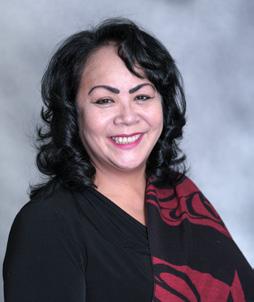
• Boots and books for children ages 0-5. The program provided storytelling, beach outings and language learning to 60 children.
• Youth Culture Camp that taught Tlingit language, arts, and harvesting and preparing of medicinal plants and subsistence foods (halibut, salmon and seal) to 60 students ages 6-13.
• Support for students to learn techniques in behavior management and discipline, and to also learn basketball skill building and drills.
» What Makes Us Resilient program (Yakutat, Alaska) that provided language learning, coping skills and cultural activities (e.g., storytelling, berry picking, fish and seal harvesting, carving, skin sewing) to 30 youth. Due to the COVID-19 pandemic, the program, which normally serves all Southeast Alaska communities, was limited to Yakutat youth in 2021.
» Esther Shay Virtual Cultural Enrichment - Tongass Tlingit Culture Heritage Institute (Saxman, Alaska) that provided cultural activities (language, dance, arts and crafts) virtually to 12 children, many of which live in foster homes and are living at or below poverty. Students were provided activity kits prior to virtual meetings.
» Tlingit Culture, Language and Literacy (TCLL) program (Juneau, Alaska) that provided healthy snacks for over 60 children who often leave home without a meal.
Partnered with the Vocational Training & Resource Center (VTRC), Association for the Education of Young Children (AEYC) and Southeast Regional Resource Center (SERRC) to provide an Early Educator Academy (Juneau, Alaska) that offered 120 hours of early childhood education training to eight participants to attain their Child Development Associate (CDA) credential.
Surveyed 53 parents and 68 providers to identify needs due to the COVID-19 pandemic.
» Provided personal protective equipment to 102 families in 18 communities who were affected by the COVID-19 pandemic.
Provided a one-time $750 stipend to 102 parents, 62 providers, and 10 foster parents. A total of $287,000 was distributed.
Provided support to the LEARN (Little Eagles and Ravens Nest), Little Moon, and ABC child care centers to designate priority enrollment to children who are in foster care, homeless or their family is receiving Temporary Assistance for Needy Families (TANF) support.
Secured contract with Southeast Association for the Education of Young Children to provide Infant/ Toddler Coaching and Mentoring, an Early Childhood Symposium in 2022: Roots and Wings –Culturally Responsive Early Childhood Education, and support for ROCK Juneau program material development for anti-bias classrooms.
Supported language learning through the distribution of X̱aad Kíl, Sm’algyax, and Lingít coloring books.
Launch online Coronavirus Response and Relief Supplemental Appropriations (CRRSA) and American Rescue Plan Act (ARPA) programs with overall goal to ensure providers who have been impacted by the COVID-19 pandemic receive financial support.
Provide support to Southeast Alaska communities interested in owning and operating day care centers.
Identify areas for additional support to existing child care providers.
Work with the VTRC to continue CDA Academy and to establish additional ongoing Early Childhood Education training.
Increase the availability of child care in child care centers by creating early educator work experience opportunities.
The 477 Employment & Training department addresses problems of unemployment and under-employment, and the economic needs of Alaska Natives and American Indians residing in Southeast Alaska. The department administers the following programs:
» Burial Assistance,
» General Assistance,
» Job Placement (Work Experience and On-the-Job Training),
» Training Services, and
» Youth Employment Services.
Due to the ongoing COVID-19 pandemic and subsequent precautionary measures taken by the Tribe and communities, E&T staff successfully transitioned to working remotely, where we have remained for a majority of the 2021 year.
Successfully delivered uninterrupted and quality services while remaining closed to the public and working remotely.
Hosted a Virtual Youth Employment Services program and facilitated a Virtual POWER Conference preparing participants to re-enter the workforce after the pandemic.
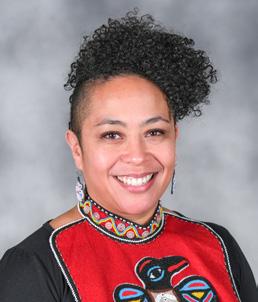
Executed a Standard Service Agreement (SSA) with the Business & Economic Development (BED) department to assist 477 clients in their job search efforts, provide more economic opportunities, and create jobs for tribal citizens in Juneau, Alaska.
Received approval to expand the Employment & Training team to include one Workforce Development Program Coordinator to focus on executing the SSA with BED while further developing the Work Experience program.
Expanded partnerships with local, state, and national entities to provide a wide variety of jobreadiness services, including, but not limited to Zoom classes, webinars, and job-related clubs.
Burial Assistance is an indigent burial program available only in the absence of other resources and provides financial assistance to Tribal citizens residing in our compact service area to defray burial expenses.
Provided Burial Assistance funds to 43 applicants in 6 Compact communities.
General Assistance (GA) provides financial assistance to eligible clients for essential needs such as food, clothing, shelter, and utilities. GA payments are not intended to pay bills, credit card debts, or loans. GA is only to be used to pay verified actual/monthly expense amounts. Clients also receive career assessment testing, educational and training assistance, job-skills development, work experience, and on-the-job training. Clients work with their assigned caseworker to develop an Individual Self-Sufficiency Plan (ISP).
Provided GA services to 105 clients residing in 4 Compact communities. There was a significant fluctuation in the average monthly caseloads as many relief programs were implemented in response to the pandemic (CARES Act, American Rescue Plan Act, Rent Relief programs, and the extension of Unemployment Insurance Benefits).
Issued over 650 benefits to clients to help meet essential needs.
Contracted with Career Services Network, LLC, to provide weekly online webinars that focused on a variety of job-readiness classes, including, but not limited to, résumé writing, interview skills, dressing for success, and time management.
Organized a drive-by 477 Spring Informational Event that provided Personal Protective Equipment (PPE) and program information to 128 Juneau families and 73 Compact families in the communities of Angoon, Craig, Hoonah, Kake, Ketchikan, Klawock, Petersburg, Saxman, Sitka, and Yakutat.

Facilitated a virtual Power Conference & Job Fair that focused on navigating the online job search, performing well during virtual job interviews, housing opportunities and funding programs available through Tlingit Haida Regional Housing Authority, improving financial literacy, and safely caring for our children while working during a pandemic. A total of 74 clients participated on day one and 68 clients participated on day two.
The Job Placement & Training Services program offers assistance with education, vocational training, and employment opportunities to eligible applicants who lack specific training or certification to be considered for employment. Clients receive career assessment testing, educational and training assistance, job skills development, work experience and on-the-job training through these services.
In 2021, there were minimal referrals to the Southeast Regional Resource Center for GED testing or the Juneau Job Center for basic office skills training due to COVID-19 safety protocols.
Provided Job Placement & Training services to 11 clients; 1 completed the Administrative Assistant I Training at the Vocational Training & Resource Center (VTRC) and intends to participate in the upcoming Administrative Assistant II Training.
Placed one client in a Work Experience position with the Tribe. Due to the pandemic, no other Work Experience placements took place for the remainder of the year.
Successfully closed and celebrated 477’s “Sewing for Safety” group that put four dedicated clients to work hand-stitching over 9,000 double-layer cloth masks to help fulfill the need for masks created by the COVID-19 pandemic. Masks were donated to tribal organizations and distributed to Delegates, staff, and tribal youth through the Back to School Backpack event.
» One Mask Maker was selected to become a Certified Bernina Technician and received specialized training in Chicago, IL. She is now the Statewide Technician and has secured permanent, full-time employment in a highly specialized field.
The Youth Employment Services (YES) program assists eligible tribal youth between the ages of 14-24 to discover career/education pathways while developing employment skills and teaching selfsufficiency. Unfortunately, due to the COVID-19 pandemic and subsequent precautionary measures the Tribe and local communities adopted, a virtual YES program was implemented in 2021. Students participated in weekly job-skills webinars, prepared résumés and cover letters, completed service projects in their local communities, and received participation stipends. The 2021 theme was, “Writing My Narrative.”
Implemented an abbreviated YES program in six communities (Craig, Hoonah, Hydaburg, Juneau, Kake, and Klawock); 10 youth participated in the program which included virtual webinars facilitated by Career Services Network and youth stipends.
Revisit the Job Placement & Training program infrastructure to identify ways we can successfully meet students’ needs while supporting their educational goals. Educational outreach and networking with educational agencies will be a top priority for our Training Caseworker.
Further develop the Work Experience program infrastructure to support self-sufficiency employment opportunities for tribal citizens, to build a temporary laborers pool for the Tribe to call upon when needed, and to help more tribal citizens earn a living wage.
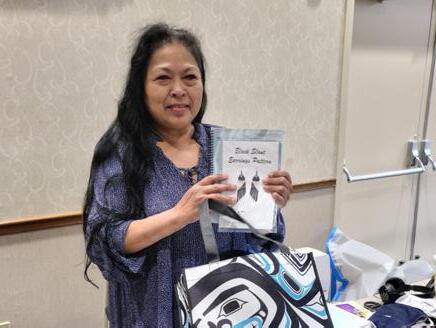

Collaborate with departments within the Tribe to complete warm handoffs between programs and to share resources with one another when a tribal citizen is in need.
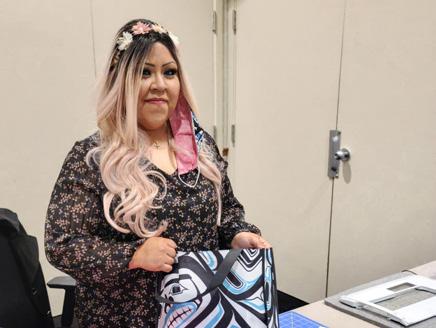
The 477 Temporary Assistance for Needy Families (TANF) department provides case management, monthly cash assistance, supportive services, and other services to eligible families within Southeast Alaska (with the exception of Metlakatla, which is located on the Annette Islands Reserve).
Services are primarily designed to assist low-income families with dependent children to become self-sufficient. The TANF department also provides TANF adult-not-included benefits to families with a disabled parent or other non-needy caretaker relative.
TANF is funded by the State of Alaska’s Department of Health and Social Services (DHSS) and the United States Department of Health and Human Services (under the Administration for Children and Families’ Office of Family Assistance).
There are four main purposes that guide TANF’s day-to-day activities:
» Provide assistance to needy families so that children may be cared for in their own homes or in the homes of relatives;
» End the dependence of needy parents on government benefits by promoting job preparation, work and marriage;
» Prevent and reduce the incidence of out-of-wedlock pregnancies and establish annual numerical goals for preventing and reducing the incidence of these pregnancies; and
» Encourage the formation and maintenance of two-parent families.
Provided TANF services to 292 families:
» $1,740,552 – Cash Assistance
» $178,521 – Supportive Services
» $18,315 – Work Experience Contracts
Continued partnership with the Business & Economic Development department to provide work experience and on-the-job training opportunities to tribal citizen clients.
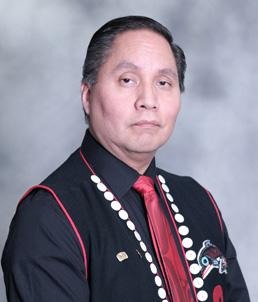
Coordinated a drive-thru Back to School Backpack event in Juneau and backpack distributions in 19 Southeast Alaska communities; 2,073 backpacks filled with school supplies were distributed to tribal citizen youth in grades K-12.
Distributed 579 backpacks to tribal citizen youth in grades K-12 residing in 30 states in the continental U.S. (outside Tlingit & Haida’s service area) through the Rescue Relief program.


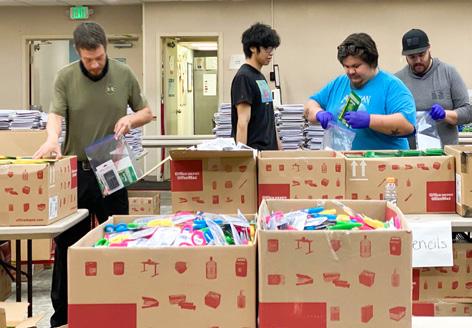
Assisted the Employment & Training department with the virtual Power Conference & Job Fair to help ensure TANF clients participated in the two-day intensive employability training conference.
Continued partnership with the Tribal Family & Youth Services department to provide parenting and relationship-oriented groups as families work towards self-sufficiency.
Increase employment opportunities for 477 recipients through partnership with the Business & Economic Development department.
Continue to develop the partnership between TANF and the Tribal Family & Youth Services department to reduce the disproportionate number of tribal youth in the custody of the State of Alaska’s Office of Children Services.
Create a resource reference guide for tribal families as an alternative to those who are ineligible for TANF services.
The 477 Tribal Child Support Unit (TCSU) provides services to all Southeast Alaska villages and communities, with the exception of Metlakatla Indian Community. TCSU is currently the only Child Support Agency in Southeast Alaska.
The majority of TCSU cases are opened when a custodial parent applies for and receives Temporary Assistance for Needy Families (TANF). Due to the 60-month limit of TANF benefits, many TANF cases are transitioned to non-assistance cases, showing a general overall trend for current support to be paid directly to custodial parents. Approximately 76% of child support is distributed directly to families and 24% to the Tribe for reimbursement of funds owed to TANF for assignment of child support rights. In 2021, TCSU’s collection rate decreased by 11.13%, which did not meet the fiscal performance goal of increasing collection by 8%.
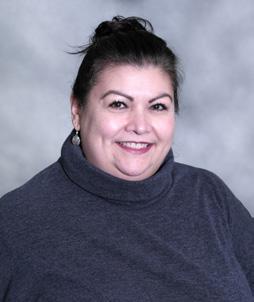
TCSU accepts all applications for child support services and makes appropriate referrals when necessary. The majority of TCSU cases are from parents or custodians who receive public assistance, i.e., TANF benefits. TCSU cases are also opened when custodians apply for other tribal services such as Employment & Training and Child Care services. TCSU received 181 applications for the year which, in turn, created 102 new cases; the remaining were added to 79 existing or reopened cases.
Increased active Tribal IV-D caseload to 1,344.
Distributed $1,185,465 in child support.
» Reached the benchmark of collecting over $1 million in child support for the fourth year in a row. TCSU specialists manage between 250-500 cases each which continues to result in higher collections.
Successfully closed 118 child support cases.
Provided “Think About It” virtual presentations that shared current statistics and the impact child support can have on life from teen pregnancy for:
» 10 Youth Employment Services participants in six Southeast Alaska communities (Craig, Hoonah, Hydaburg, Juneau, Kake, and Klawock), and
» 78 Yadaa.at Kalé (Juneau-Douglas High School) students in Juneau, Alaska.
Submitted 187 Alaska Permanent Fund (PFD) garnishment requests.
Received 71 paternity establishment requests for tribal youth: 25 were not eligible to establish due to case closure or unknown father, 6 were hard to establish due to not enough information to proceed or non-cooperation, and 40 were eligible for paternity establishment. Of the eligible cases, 18 have been referred to other states, 13 are pending, and 9 are in process with Tribal Court.
Participated in the annual WICSEC (Western Intergovernmental Child Support Engagement Council) conference virtually October 28-30. The conference concentrated on interagency collaboration (federal, state, tribal agencies) and shared trends seen in child support caseload, best practices, and self-care.
Implemented a quarterly training/continuing education plan for TCSU staff.
Successfully expanded off-site staff with approval of Tlingit & Haida President and the Federal Office of Child Support Enforcement:
» TCSU Attorney is working remotely from Seattle, Washington, and
» TCSU Manager is working remotely from Bend, Oregon.
Increase collections by at least 8%.
Promote staff training and continuing education to strengthen industry knowledge and job performance.
Increase outreach efforts by re-establishing relationships with key organizations in the community (AWARE, Gastineau Human Services, Lemon Creek Correctional Center, and Reentry & Recovery) to assist our clients.
Launch the You Matter program that will focus on assisting noncustodial parents with employment and educational opportunities in order to seek employment opportunities and/or increase their opportunities for advancement in their area of work.
Hire TCSU staff for the Tribe’s new offices in Anchorage and Seattle offices to increase our accessibility to our clients.
Develop a new program to provide employment services to non-custodial parents.
The 477 Tribal Vocational Rehabilitation (TVR) department provides culturally relevant vocational rehabilitation (VR) services in collaboration and partnership with State of Alaska, Division of Vocational Rehabilitation (ADVR) to eligible Alaska Natives and American Indians (AN/AI) with disabilities residing in Southeast Alaska. VR services assist clients in planning their path to maintain or achieve gainful employment, selfemployment, and small business ownership.
The department works to empower tribal citizens with disabilities to become self-sufficient and live independently through an array of VR services that are designed to help them achieve their unique employment goal.
Due to the COVID-19 pandemic, VR service opportunities were limited in 2021 which hindered TVR’s ability to achieve its goals and objectives.
TVR services include:
» Guidance and counseling throughout the VR process.
» Referrals to appropriate employment agencies – tribal/federal/state for jobs that best suit their skills, abilities, and strengths.
» One-on-One counseling when a client needs moral support, discussion on basic needs, training or issues surrounding impediments to employment.
Provided VR services to 62 clients of which 3 secured and/or maintained employment.
Provided small business support to one client who successfully developed a business plan to launch a small business in early 2022.
Successfully assisted three clients in securing Work Experience positions with:
» Goldbelt Tram
» Sacred Grounds Café
» Sacred Shine Auto Detailing
Continued to assist clients with education/vocational training:
» One client completed the Mine Safety & Health Administration (MSHA) course through the University of Alaska Southeast.
» One client received a Certificate of Completion for Administrative Assistant training via distance education through the Vocational Training & Resource Center.
» One client enrolled in Purdue University Global, an accredited online university, for an Associates of Science of Legal Support and Services.
» Four clients enrolled in University of Alaska Southeast courses (Fundamentals of Oral Communication, Northwest Coast Art, Tlingit Language, and Sociology).
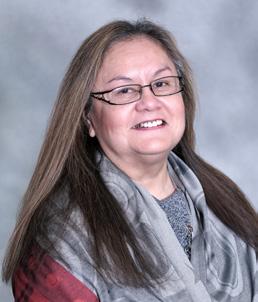
» Five clients registered and participated in the 477 POWER Conference & Job Fair.
» Two clients participated in a Career and Life Skills workshop.
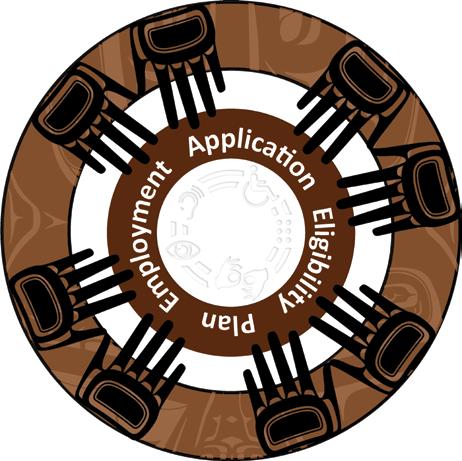
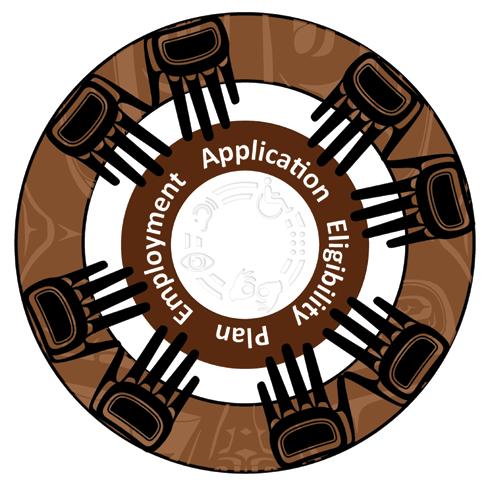
Awarded a five-year grant (2021-2026) in the amount of $3,167,875 from the U.S. Department of Education, Rehabilitation Services Administration (RSA).
Completed five client psychological assessments.
Participated in virtual Region 10 Vocational Rehabilitation Coalition meetings.
Referred nine clients to ADVR for VR services.
Provide VR services to 62 tribal citizens with disabilities.
Successfully close three cases that result in clients securing and/or maintaining employment.
Secure five-year grant from U.S. Department of Education – Rehabilitation Services Administration (USDOE/RSA).
The Elizabeth Peratrovich Hall (EP Hall) is located in the heart of downtown Juneau, Alaska and offers event space for conferences, meetings, weddings, and more while also providing courier services to the Tribe’s many Juneau office locations.

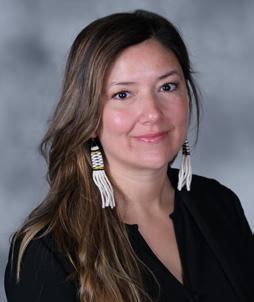
Tlingit & Haida is working actively to make the EP Hall the event venue of choice in Juneau. Due to COVID-related renovations that occurred in the Andrew Hope Building, including floors, hallway, restrooms, plumbing, and air conditioning, the Elizabeth Peratrovich Hall was closed for nearly six months in 2021.
Generated $576,333.25 in gross revenue with a net income of $255,606.82.
Upgraded air conditioning and heating systems for a more comfortable experience for customers, clients, and guests.
Successfully expanded services to accommodate hybrid events as a result of the COVID-19 pandemic.
Provided two soundboard trainings to increase staff development.
Worked with Tlingit & Haida’s Tribal Emergency Operations Center and the City and Borough of Juneau to identify ways to host events safely during the COVID-19 pandemic.
Increase revenue beyond pre-pandemic levels.
Develop a user-manual for audio-visual equipment and inventory map for efficient staff onboarding.
Update equipment rental price sheet.
Overhall the EP Hall website for a better user experience and ease of online booking.
Become the venue of choice in Juneau for weddings, conferences, and special events.
The Little Eagles and Ravens Nest (LEARN) is a state-of-the-art early learning environment conveniently located in the heart of Juneau. As a State-Licensed child care center, LEARN provides culturally responsive and developmentally appropriate curriculum year-round to children 0-6 years of age.
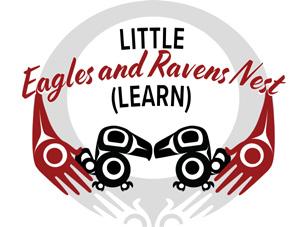
LEARN is staffed by a team of high-quality early educators dedicated to children’s development and well-being and offers a natural environment that encourages open-ended play and exploration. Wholesome familystyle breakfasts, lunches, and snacks are provided by Smokehouse Catering.
Secured a bi-annual State of Alaska Child Care Center License for operation valid through December 31, 2023.
Partnered with United Way to contract an Early Literacy Tutor through the AmeriCorps Service Program.
Partnered with the Tribe’s Child Care department to provide care for 15 high-risk, high-needs, and foster tribal children.
Earned $277,633 in gross tuition revenue.
Due to the COVID-19 pandemic, LEARN operated at 50% capacity and provided care to 48 children ages two months to six years with 30 children receiving care in December 2021.
» 69% of children served are Alaska Native.
» 45% of children served have one or both parents employed by Tlingit & Haida.
» 46% of children served received child care assistance.
» 25% of children served are considered “high-risk” with parents who were on Temporary Assistance for Needy Families (TANF), experiencing homelessness, or in the foster care system with Office of Children’s Services (OCS) involvement.
Participated in Haa Sh Kalneegi, Our Story, a place-based cultural equity training tool for care providers, families, and children.
Administered a parent satisfaction survey to secure feedback and comments on our quality of care and services.
In response to feedback received, LEARN developed a monthly newsletter “A Look at LEARN” so parents could feel more connected to their children’s classrooms.
Completed requirements to reach Learn & Grow Level 1, the State of Alaska’s Quality Recognition and Improvement System for licensed Child Care programs, and began work toward Level 2.
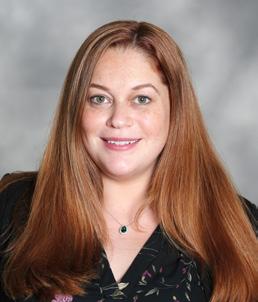
Collaborated with the Tribe’s other early education programs to develop proposal for an Early Education Campus.
Secured, in collaboration with Tribe’s early education programs, Premium Pay (temporary increase of $4 per hour) for early education staff during hours working directly with unvaccinated children.
Partnered with Southeast Regional Resource Center’s (SERRC) work experience program to host a tribal citizen intern who completed training, job shadowed and worked towards qualifications for full-time employment at LEARN.
Completed five days of in-service professional development including training in the art of infant massage, and “Circles of Security”, a relationship-based early intervention program.
Transitioned from Business and Economic Development department to the Cultural Heritage and Education Division to allow the Tribe’s early learning programs to work collectively in providing services to tribal citizens and families.
Reach Level 2 in Learn and Grow – the State of Alaska’s Quality Recognition and Improvement System for early learning programs.
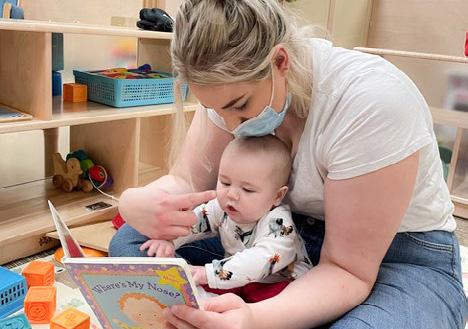

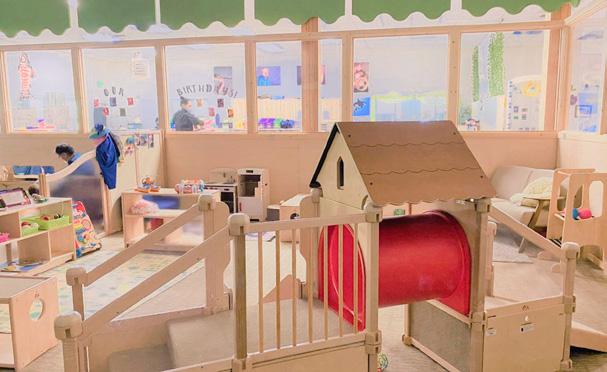
Increase capacity – continue LEARN’s successful mitigation plan efforts and increase capacity in all classrooms.
Increase staff retention to improve quality and consistency needed for relationship-based care.
Sacred Grounds Café is a tribally owned coffee shop in Juneau, Alaska offering breakfasts, lunches, espresso, smoothies, and delicious pastries. Sacred Grounds proudly maintains a Native hire rate of nearly 100% and actively supports other Native-owned businesses and Native artists.

In addition to offering region-wide barista training, Sacred Grounds Café continues to partner with the Tribe’s 477 departments to help tribal citizens gain employment placement and opportunities to enhance employability and strengthen employment history.

Increased gross revenue from $265,127 in 2020 to $532,562 in 2021, with a net profit of $116,753.
Improved beverage consistency and food service, began offering grab and go options for food and increased online ordering through the use of the Toast TakeOut app.
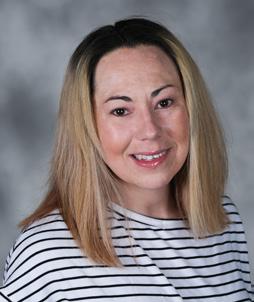
Increased Sacred Grounds’ square footage at the Andrew Hope building by adding outdoor seating.
Improved flagship location by installing a stunning wall mural created by tribal citizen artist Michaela Goade and a metal carved formline artwork created by tribal citizen artist Robert Mills.
Expanded Sacred Grounds brand by implementing staff uniforms and launching retail sales of custom hoodies, stickers, and coffee bags.
Renewed lease with Bartlett Regional Hospital Foundation to maintain café space inside the gift shop.
Expand the Sacred Grounds brand to include other lines of business such as roasting and a drive thru location.
Participate in Coffee Fest 2022 to network with national industry professionals, discover what’s trending and relevant, learn new skills, be inspired and gather resources to help ensure Sacred Grounds’ continued growth and success.
Work with the Business & Economic Development department to host First Friday events.
Develop a weekend brunch menu.
Secure coffee service contracts with tourism charters.

Sacred Shine Auto Detailing (Sacred Shine) provides excellent customer service while cleaning vehicles, surpassing industry standards and/or client specifications. With a mission and a vision to go above and beyond customer expectations, Sacred Shine consistently delivers a work of excellence by using the skill and knowledge that comes with years of experience and by only using premium quality and environmentallyfriendly products.
Sacred Shine proudly maintains a Native hire rate of 100%.

Generated $262,367 in gross revenue that resulted in a net profit of $18,595 in 2021.
Successfully attained Jade certification through Detail King LP ’s Ceramic Coating Training & Certification class. Sacred Shine is now certified to provide ceramic coating services.
Relocated to a larger space to accommodate increased business and to allow for further expansion. The space is located at 1721 Anka Street in Lemon Creek.
Developed a plan to launch a mobile detailing unit in 2022 that will offer ‘on-the-go’ auto detailing training to communities in Southeast Alaska.
Achieve 3M graphic installation certification to expand services to include vinyl fleet/vehicle wraps.
Expand detail services to include interior repairs, window chip repairs and replacements.
Partner with Tribal Transportation to provide fleet maintenance (tire changes, oil changes, and routine vehicle maintenance) for the Tribe’s GSA vehicles.

Smokehouse Catering is one of the only tribally-owned catering companies in Alaska. With a vision of providing an authentic, costeffective, and delicious Indigenous experience, Smokehouse Catering meets the Tribe’s internal food service needs while capitalizing on external opportunities to raise awareness of who the Tribe is and what we do throughout the Alaska Native community.
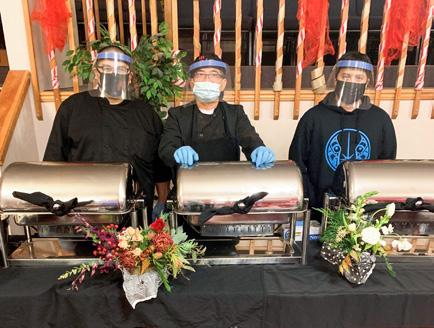

Like Tlingit & Haida’s other enterprises, Smokehouse Catering partners with internal departments and programs such as Head Start, Little Eagles and Ravens Nest (LEARN), Temporary Assistance for Needy Families (TANF), Motherhood Is Sacred® and Fatherhood Is Sacred® to provide employment opportunities for tribal citizens. Smokehouse Catering also partners with external organizations such as REACH, a non-profit organization dedicated to creating communities free of barriers for people with disabilities.
Generated $960,525 in gross revenue with a net profit of $147,862.
Celebrated three years of service to the community.
Contracted with Allen-Marine, a Native-owned business, to provide lunches for their summer operations.
Partnered with Sacred Grounds Café to provide grab and go breakfasts, lunches, and snacks.
Adapted to catering in the pandemic by offering pre-boxed meals with an option for drive-by pick-up and buffet lines with an attendant to reduce risk.
Continue to improve safe ways to offer catering to clients while adapting to the COVID-19 pandemic.
Continue to develop community relationships to increase sales.
Work with consultant to ensure we are following best practices for the industry.
Southeast General Contractors (SGC) is one of Tlingit & Haida’s newest tribal enterprises and carries out all of the renovation, new construction, and general maintenance needs of the Tribe. SGC works closely with the Tribe’s client service programs to provide work experience and training opportunities to tribal citizens interested in entering the construction trade.
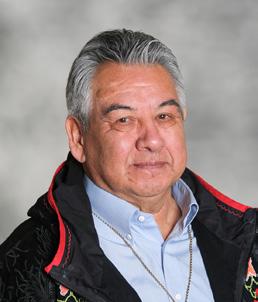
In 2021, the company completed 14 projects while employing 13 laborers and carpenters and four administrative staff, of which 90% were Native hire.
SGC has joined The Plans Room, LLC, an information center for the commercial contracting/construction industry in Alaska and plans to continue growing to expand into larger projects and outside jobs.

Generated $1,759,922 in gross revenue that resulted in a net profit of $128,795 in 2021.
Completed renovations to the Native Land & Resources department’s offices at the Edward K. Thomas Building in Juneau, Alaska.
Completed renovations to the Head Start center in Craig, Alaska.
Successfully installed a 20-foot aluminum canoe sculpture “Yaadachóon” along the seawalk at Overstreet Park in Juneau, Alaska.
Completed the construction of Allen Court non-congregate shelter in Juneau, Alaska.
Completed substantial remodeling and constructed three new offices in the Andrew Hope building in Juneau, Alaska.
Remodeled the Public Safety department’s offices on Concrete Way in Juneau, Alaska.
Completed installation of windows and siding at the Alaway Avenue non-congregational shelter in Juneau, Alaska.

Secured a General Contractor license to begin bidding on outside projects.
Implement SAGE 100, a cloud-based accounting software.
Complete remodeling of the Andrew Hope building bathrooms.
Complete a tiny house model that can be used to build eight tiny homes for Hoonah Indian Association.
Remodel the Tribe’s newly acquired Willoughby Avenue properties in the Aak’w Village District.
The Tlingit Haida Tribal Business Corporation (THTBC) is a wholly-owned business enterprise of the Tribe that operates as a holding company for its subsidiaries. THTBC’s mission is to engage in business and economic development to improve the economic condition of the Tribe.
THTBC continues to add capabilities and locations in existing lines of business. In addition to our existing lines of business and customer base, the company is expanding into other areas – GSA Schedule, Space Industry, and International Logistics. This expansion reduces the company’s risk since THTBC diversifies its sources of revenue.
As a result of the COVID-19 pandemic, there were delays in solicitation release dates and contract award dates; however, THTBC continued to grow as newly awarded contracts came online.
THTBC is competing under teaming agreements for billions of dollars in contract opportunities. Based on the past record of success, THTBC expects to participate in a significant percentage of awards from contracts over the next five years, while maintaining and improving both profitability and performance quality ratings.
Du aani Kax Naalei Richard Rinehart Jr. Chief Executive Officer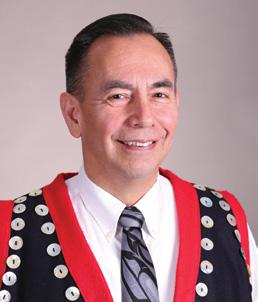
Recorded highest revenue in the company’s history closing 2021 with a total annual revenue of $184 million and net income of $3.5 million.
Defended all important re-competes.
Issued first dividend distribution of $1 million to Tlingit & Haida.
Build on contracts won but not yet awarded.
For 2022, THTBC is budgeting revenues of $225 million and net income of $4.5 million.
Increase subsidiaries’ sole source work.
Minimize exposure to costs of capital expenditures through THTBC’s sound business strategy, which reduces financial risk and cost to acquire new contracts.
Numbers under “SERVED” reflect the total number of individuals who received services, not the






































PROGRAM NAME
Elderly Emergency Assistance
Reentry & Recovery
Tribal Child Support Unit
PROGRAM NAME
Child Care Development
Head Start
Higher Education
TANF
Tribal Child Support Unit
Tribal Court
PROGRAM NAME
















Burial Assistance
Child Welfare / ICWA
Diligent Relative Searches
General Assistance
Head Start
Higher Education
Realty/Forestry
TANF
Tribal Child Support Unit
Village Public Safety Officer
SKAGWAY
PROGRAM NAME SERVED












December 31, 2021 Ending Balance: $23,569,893
2017 collections decreased due to the PFD being decreased.


*Tribal citizens residing outside of the 21 registered communities and not currently registered to a community.



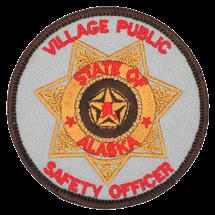



JANUARY FEBRUARY
Virtual Elders Talking Circles launch to provide a safe space to connect, share and participate in cultural activities.

Emerging Leader Simon Friday elected Co-President of NCAI Youth Commission

MARCH APRIL
Virtual Lunchtime Chat with Dr. Elliot Bruhl provided an update on COVID-19 vaccinations.
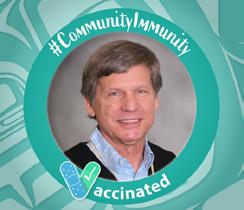
477 Spring Informational event hosted to provide goodie bags with program information and treats for the family.

MAY JUNE
Disaster & Resiliency
Virtual Expo held to help communities prepare for natural disasters and emergencies.

COVID-19 vaccination campaign launched to promote community immunity.
JULY AUGUST
New Wellness Wednesday virtual series launched to empower tribal citizens to improve their overall personal wellness.

Tlingit & Haida granted 2.5 GHz wireless spectrum license by Federal Communications Commission.

SEPTEMBER OCTOBER
Tlingit & Haida Youth Summit held – Your Vision, Our Future.


First Trunk or Treat Halloween Costume Parade held for tribal citizen youth.

NOVEMBER DECEMBER
Inaugural virtual Executive Council Townhall Meeting held.

Official website for Community & Behavioral Services Healing Center launched.
